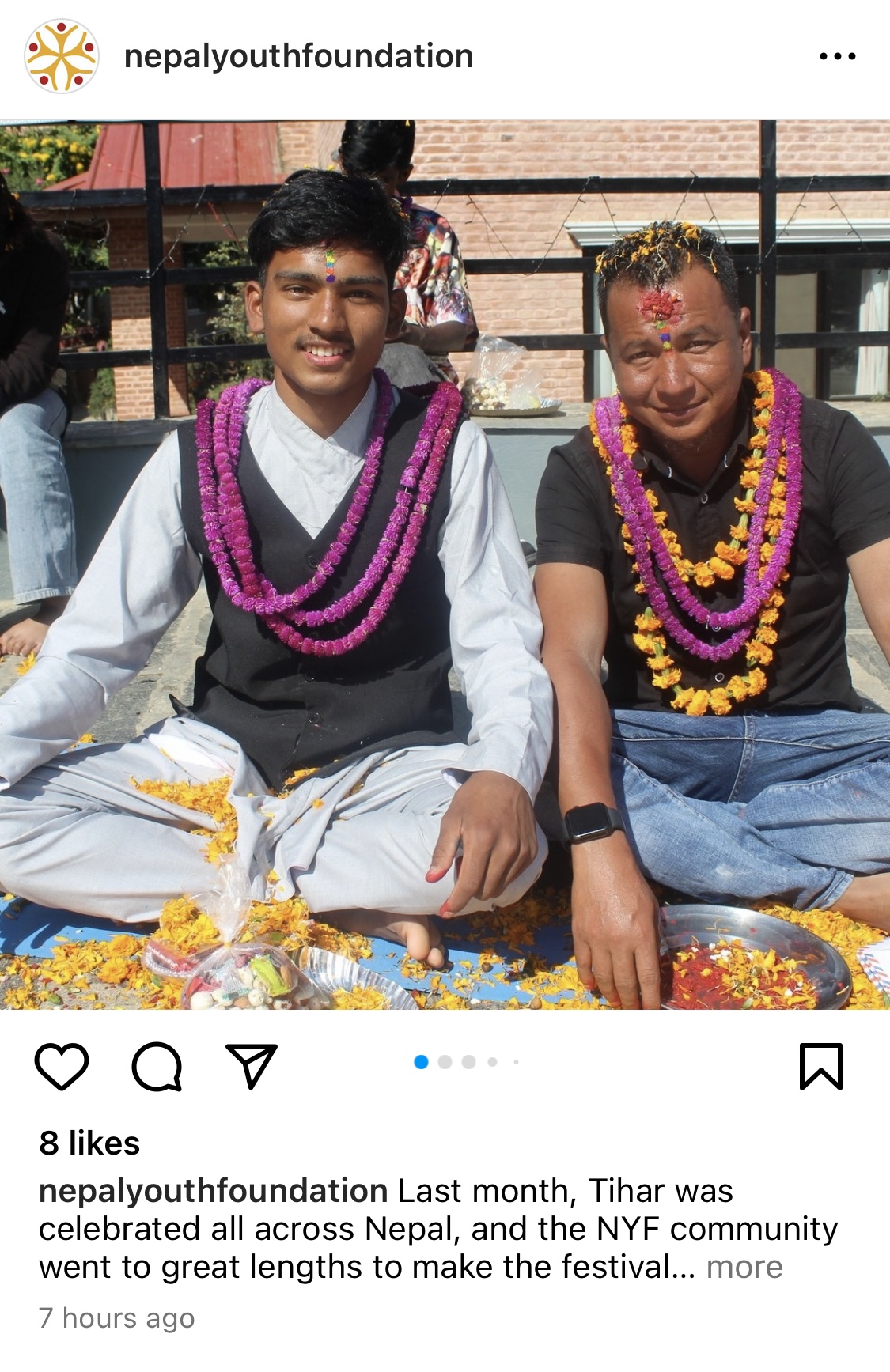Category: NYF News
In Loving Memory of Olga Murray (1925-2024)
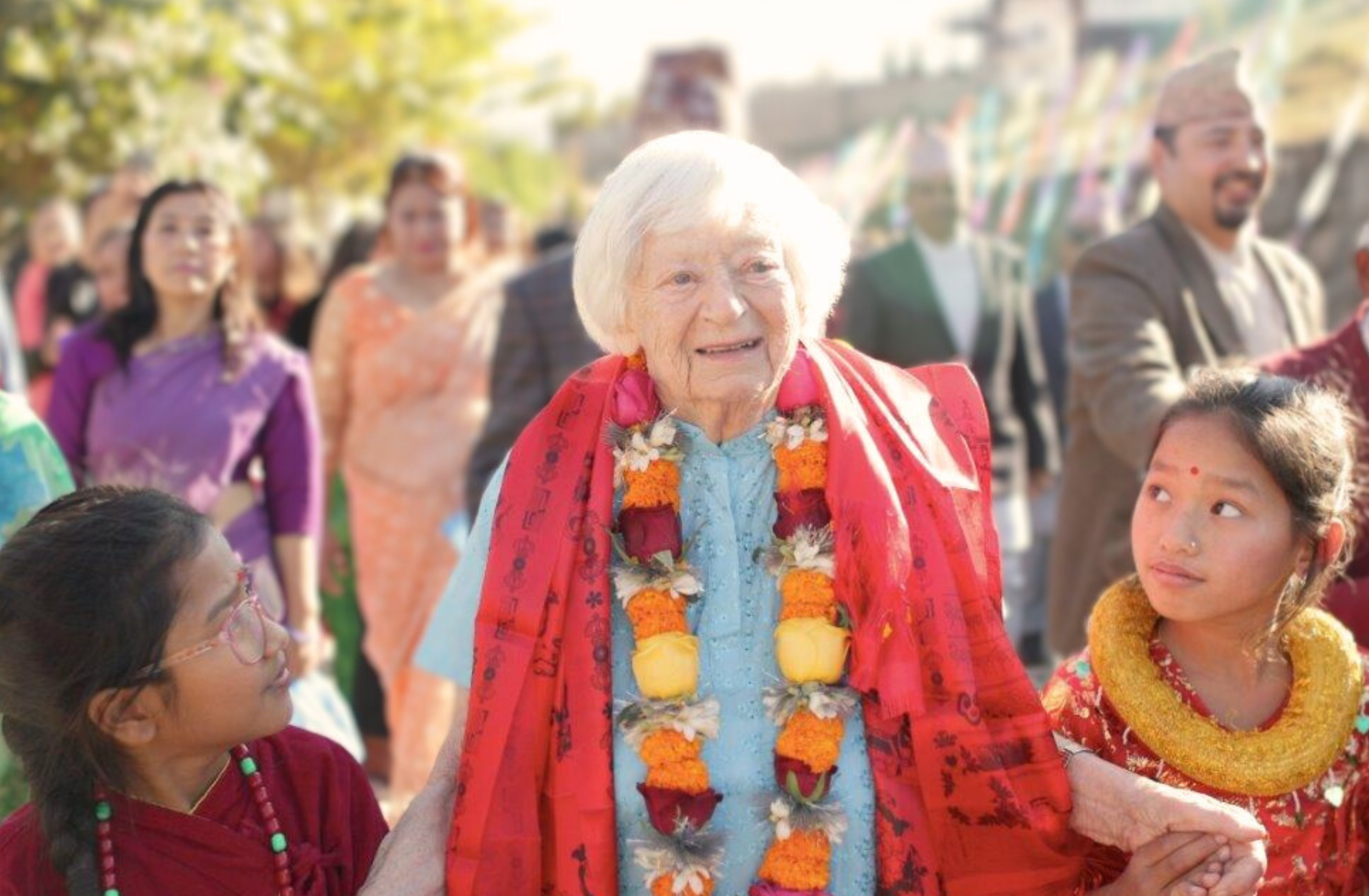
Olga Murray, beloved founder of the Nepal Youth Foundation, left us peacefully on February 20th at her home in Sausalito, California. She was surrounded by love, in the form of many individuals whose lives she enriched through her generous spirit and passionate work.
While our hearts are very heavy, we take great strength from her enduring love, legacy, and undying commitment to the children of Nepal.
Since her passing, the outpouring of love and support from our incredible community has been both humbling and uplifting. As we come together to honor her legacy, we are reminded of the impact she made not only in Nepal but around the world. We want to express our deepest gratitude to every one of you for your reflections, kind memories, and unwavering support during this time. Your words have brought comfort to us as we navigate this loss together.
Visit Olga’s memorial page
To honor Olga Murray’s life and legacy, our team has created a memorial page where community members can gather virtually. We invite you to visit this page often, and hope you will find comfort in the presence of others who loved and supported Olga throughout her life.
The memorial page includes links to published obituaries, a beautiful photo gallery, details on how to make a tribute gift, and a public tribute wall, where you can share your favorite photos and stories of time with Olga, as well as any messages you may wish to share with her loved ones and friends.
You can also read Olga’s obituary published digitally in the San Francisco Chronicle here, and in the Marin Independent Journal here.
Ceremonies & Celebrations of Life
Our Nepal team has already hosted a beautiful memorial ceremony at Olgapuri, where staff members and beneficiaries gathered to celebrate Olga’s life and reflect on her remarkable contributions. This provided the Olgapuri children, for whom Olga was a stable, loving, warm, encouraging elder and family member, the opportunity to share the impact of this loss as a community.
We look forward to honoring and celebrating Olga’s extraordinary life, legacy and the ongoing work of NYF with the broader community during our Founder’s Day event this summer.
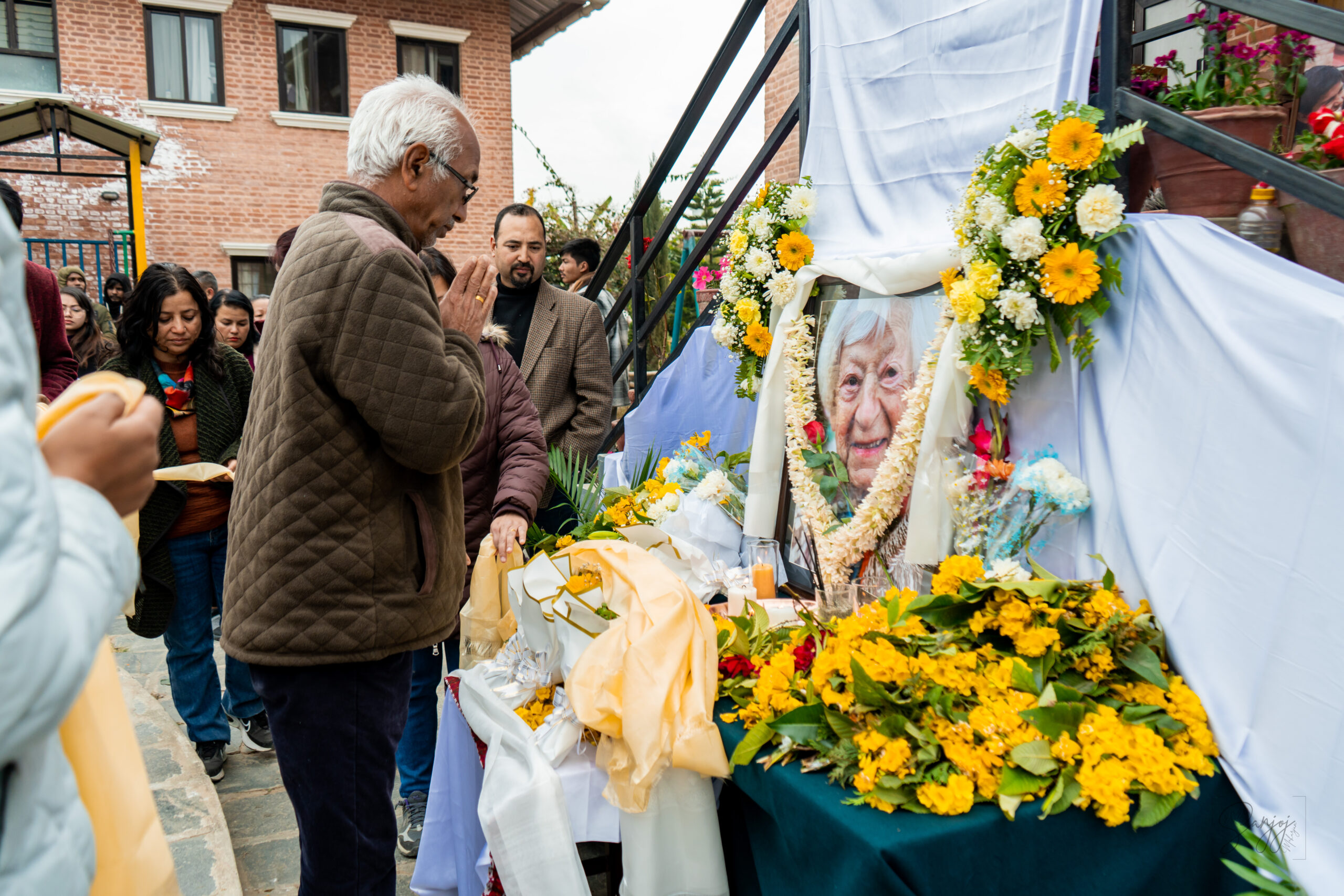
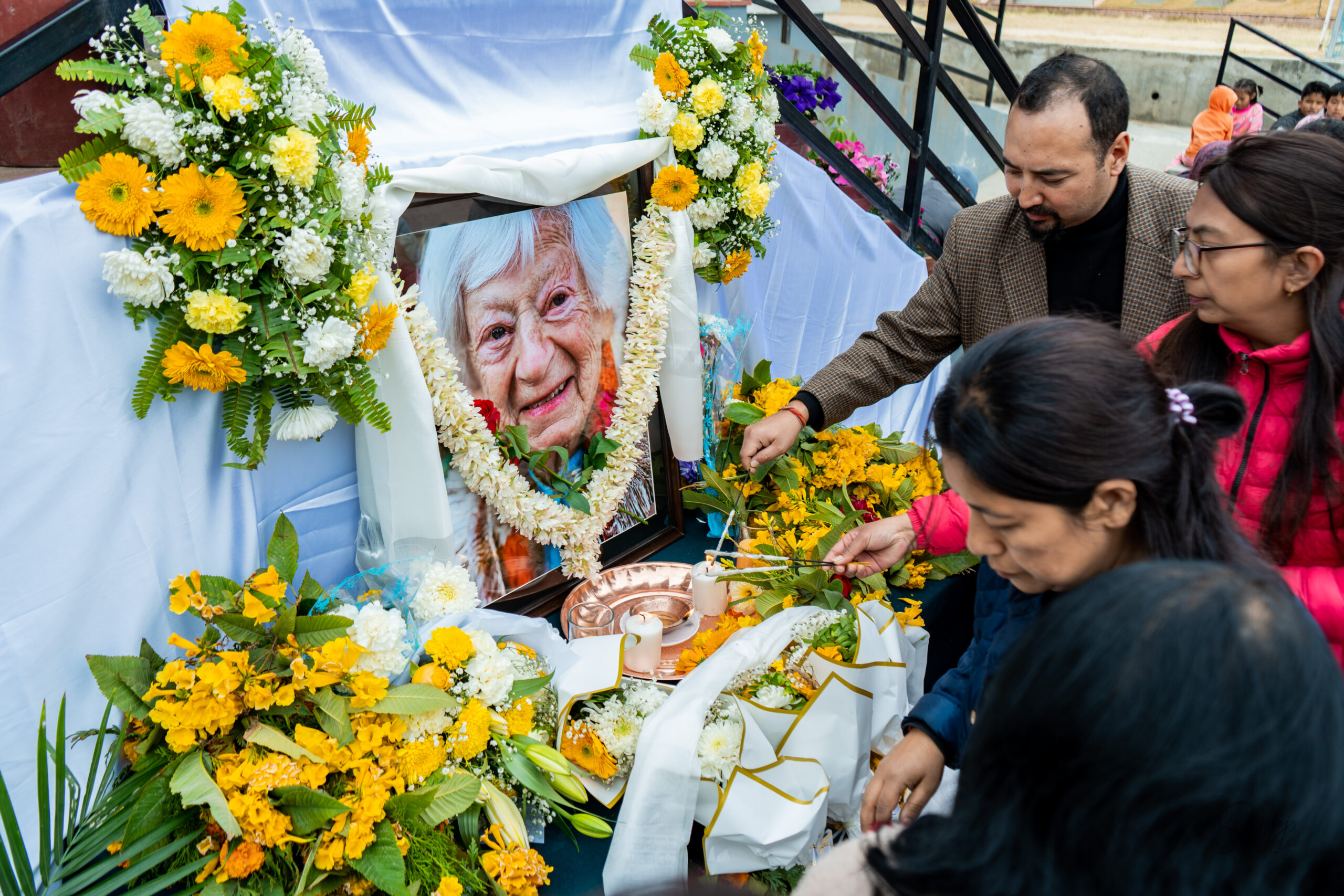
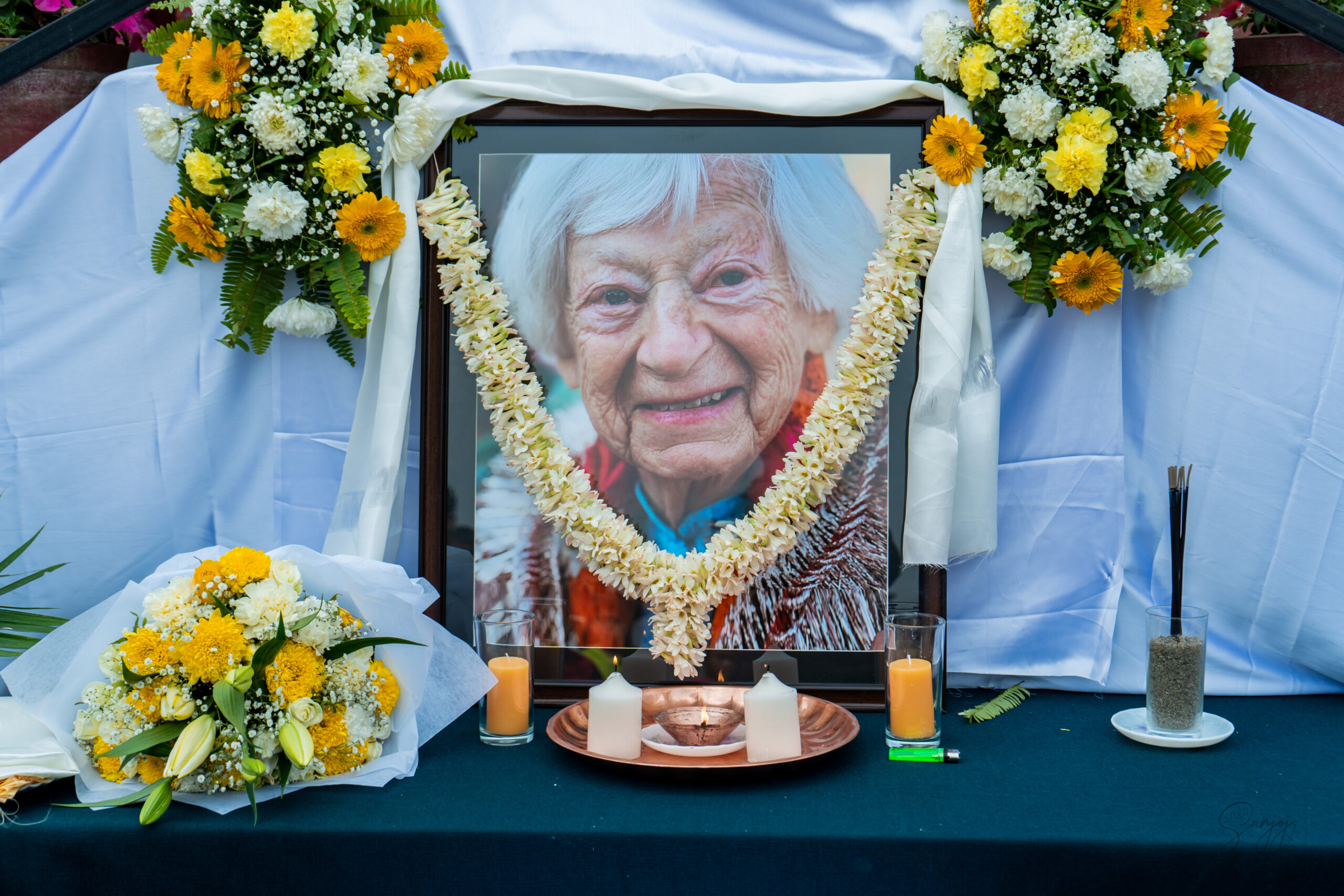
Propelling Olga’s Promise
In the days ahead, we are inspired to fulfill Olga’s promise – her dream of helping countless individuals in Nepal. She has always been grateful to the NYF Community for sharing in this promise to empower Nepal’s children, and we know that Olga took great comfort (and pride!) in the knowledge that, thanks to friends like you, this remarkable work would continue well beyond her own extraordinary lifetime.
This shared promise is one we will all carry forward in her honor. Together, we will continue Olga’s mission, making a difference in the lives of those she cared for so deeply.
2023 Impact Stories: Thank you!
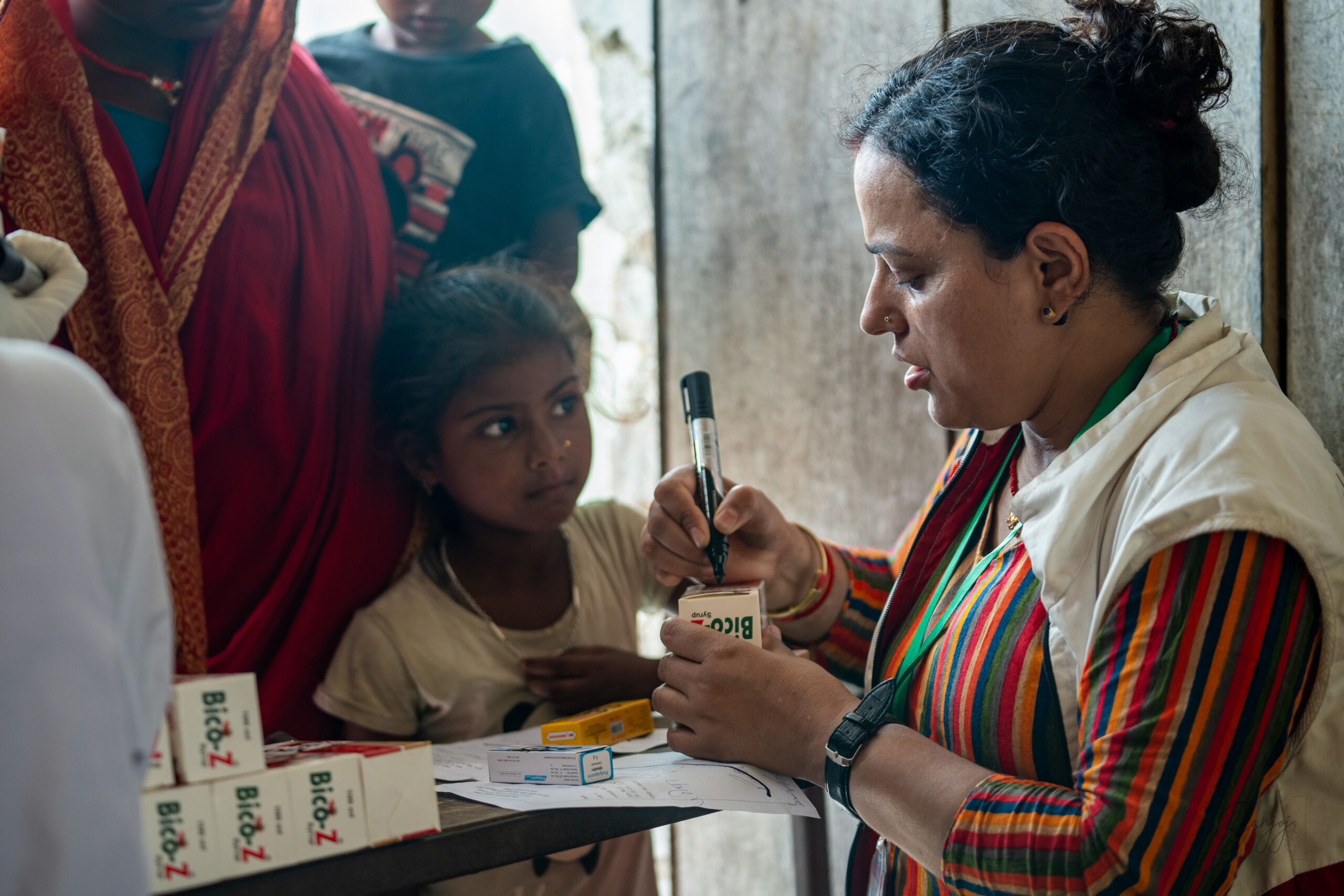
(Above, Caste Equality Project in April 2023) – NYF nurse Radhika Sapkota dispenses multivitamins for children who have completed their check-ups at the Nutrition Outreach Camp. No one in 7-year-old Esha’s* household can read, so Radhika explains the dosage in a bit more detail to Esha’s mother. As she does so, she makes some simplified marks on the vitamin box to help her remember the instructions.
2023 Reflections & Highlights
As we begin the new year, our global team is deeply grateful for everything we accomplished with your support last year:
- In February 2023, NYF celebrated the 25th anniversary of the opening of our flagship Nutritional Rehabilitation Home.
- Our first 16 Educating Dalit Lawyers scholarship recipients officially entered law school. They are impressing their professors with their passion and dedication to the law.
- Over the summer, our nutrition team helped launch the Caste Equality Project in Saptari District. They provided nutritional outreach and care to over 5,000 children and their caregivers.
- In July, Ankur Counseling Center launched a Community Mental Health program to nurture mental wellness and empower individuals to recover from mental health crises.
- Our Kinship Care program is now providing enriched care to keep girls in school, lowering the risk of child marriage.
- We expanded the mission of our New Life Center to offer services to children visiting Kathmandu for critical medical services.
- And thanks to careful observations and learnings from our work during the COVID-19 pandemic, we re-envisioned our Olgapuri Vocational School “satellite” trainings. They are now more impactful than ever in upgrading the standard of living in rural villages.
The above are just a handful of highlights from our work in 2023. And while we’re proud of these accomplishments, we know that the real impact NYF makes are shown in the individuals we work with. So on that note… we wanted to compile and share some of our favorite stories from 2023!
We hope these stories showcase NYF’s love, care, and commitment for the youth and families we work with. We also hope you feel proud of the impact we are making together every day.
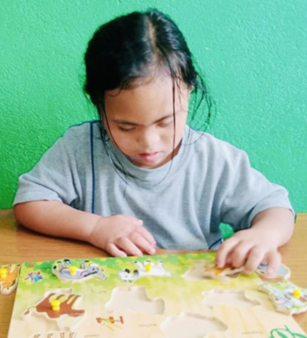
Kriti*
Scholarships for Students with Disabilities
Seven-year-old Kriti* loves puzzles, picture books, and making new friends. But because schools equipped for students with intellectual or developmental disabilities are rare in Nepal, Kriti (who has Down syndrome) has spent most of her life at home, unable to attend classes like the other children she likes to play with.
NYF has offered Scholarships for Students with Disabilities for over 30 years, but until now, these scholarships were limited to students with physical disabilities, like deafness or mobility challenges. This was due to the limited number of safe schools for students like Kriti.
NYF is so pleased that this has changed in recent years. Our team of social workers have assessed several Kathmandu Valley schools for students with special intellectual or developmental needs. Three of these schools have inspired our team’s confidence enough that we have opened the Scholarships for Students with Disabilities
scholarship program to include students living with intellectual disabilities. In 2023, we welcomed 23 such children into this scholarship category!
Our social workers have made valuable connections within these schools, allowing for open dialogue about each student’s needs. NYF is also engaged with the parents of these children, who are tremendously relieved to know that resources are available to help families like theirs provide safe, loving, encouraging educational care for their children.

“NYF … has a philosophy of ‘working themselves out of a job’. Truly unique among NGOs, NYF will choose a mission, will create solutions and then hand off the new model to local people to run. This is not only a very respectful and sustainable model, but it also frees up the organization so they can tackle the next challenge.”
— Sheila, Supporter
Chandra*
Kinship Care
Grandpa, or Hajurba Kumar, is raising Chandra, 14, whose father died in an accident many years ago. Chandra’s mother remarried soon thereafter. Her new husband’s family refused to accept her son into their family, since he was not part of their paternal line.
Chandra’s grandparents stepped in to provide the little boy with a stable home. This allowed their daughter, Chandra’s mother, the opportunity to build a more stable life for herself as well, in a social context that is often extremely challenging for single mothers without the education to support a good-paying career.
Today, Hajurba Kumar, now widowed, is raising Chandra. Chandra is Hajurba Kumar’s pride and joy. The loving, supportive connection between them is warm and strong. This has provided Chandra with a wonderful foundation as he enters his teenage years.
An NYF Kinship Care stipend has kept this family together as Hajurba Kumar ages. Your support is allowing them to prioritize Chandra’s education without worrying about the money required to keep this growing young man properly fed as he enters his voracious teenage years!
Chandra is currently thriving in the 8th grade. He routinely scores in the top five students of his class. He has a great future ahead of him, and we are so grateful to you for making it possible.
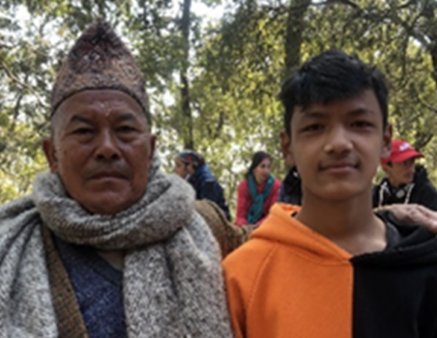

“Taking on herculean tasks, NYF has tackled Nepal’s biggest obstacles and continues to drive change. So many lives have been impacted as a result of this work.”
— Andrew, Supporter
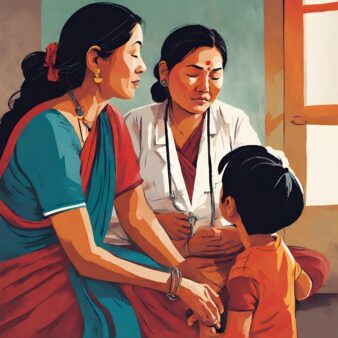
Bhagwati*
New Life Center
Bhagwati*, 34, lost her husband several years ago. His death revealed a secret that would drastically impact her life, and the lives of her two young children. He had been living with HIV, and, fearing the devastating social stigma of this diagnosis, had not disclosed his status to anyone, not even Bhagwati.
Soon after his death, Bhagwati began experiencing frightening symptoms of her own. “Weight loss, persistent cough, and difficulty breathing became a part of my daily struggle,” she says. “I visited the hospital, and when the doctors saw the seriousness of my condition, I was referred to a special hospital in Kathmandu.”
In early 2023, Bhagwati was diagnosed with HIV. To her dismay, her youngest son was also found to be living with the virus. She felt as though her entire life was crashing down around her.
When Bhagwati’s health had stabilized enough for a transfer, the hospital referred her and her son to the New Life Center. There, she would learn techniques for managing her son’s health, as well as her own.
“Our stay at the NLC proved transformative,” Bhagwati says. “Our care was all-encompassing—nutritional meals, essential medications, crucial lab tests, and, most importantly, counselling services to address our emotional well-being. We were discharged after a three-month stay, armed with medicine and a newfound resource when we need it the most.
“Since then, we have been taking our antiretroviral treatment regimen. The journey hasn’t been without its challenges, but we’re not alone. The project staff that had become our pillars of support during our time at the NLC continue to stand by us. Whenever hurdles arise, they’re there, offering guidance and a helping hand.”
(To protect Bhagwati’s privacy, this illustration was created by AI based on photos from the NLC.)

“As a donor, I have been involved with Nepal Youth Foundation for over 15 years and have supported a young girl’s education from high school all the way through medical school. She has become a successful surgeon and is making a contribution to the Nepalese society.”
— Yat-Ping, Donor & Volunteer
Nisha*
College Scholarship Program
Nisha* was raised in NYF’s care, so our team was deeply proud to witness her receiving her diploma from one of Nepal’s top universities this year!
A bright student with a sparkling presence, Nisha has dreamed of a career in the media for a long time. Her new degree in Media Studies from the School of Arts at Kathmandu University (and her stellar GPA) have already landed her a job in the media department at a travel company, where she’ll gain excellent on-the-job experience.
Someday, Nisha hopes to team up with other young media professionals to make a big difference for communities across Nepal. Thank you for helping Nisha, and many other young people like her, access the education that opens these remarkable opportunities!
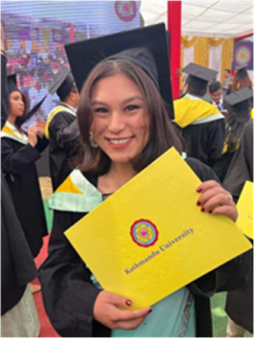

We are thrilled to be supporting NYF for such outstanding work they are doing to improve the quality of lives of children in Nepal through education.
— Sunita, Supporter
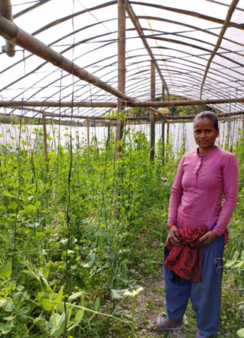
Pooja*
Vocational Training & Career Counseling (SAAET Project)
Pooja*, 33, lives with her husband, mother-in-law, and three children. She can’t remember ever having attended school, though she can read Nepali if given enough time to focus. Her family doesn’t have much, relying primarily on daily income her husband earns from taking on daily labor jobs. Pooja had to ask him for money for every basic expense. This caused a great deal of friction in the relationship.
For this reason, Pooja aspired to have an income of her own, to support her children and family and to fulfill her own needs as well. She learned about the SAAET Project from her local women’s co-op group and took part in the October 2022 session.
She constructed her first greenhouse quickly after completing the training session. By late January 2023, she had already sold an entire crop of cauliflower. Encouraged by this success, she added a second greenhouse, where she planted peas and green beans. By spring, Pooja was handling basic household expenses on her own—which transformed her previously-tense relationships with her husband and mother-in-law.
Pooja’s husband realized if he helped with the greenhouses, he could bring in more money for the family than his daily labor did. In strong partnership, he has joined Pooja’s endeavor, and they are now investing some of the year’s profits in a third greenhouse.

“The DH Ross Foundation has made a number of grants to NYF over the last 20 years. We have been consistently impressed by their work providing a range of educational and health and nutrition services to children and youth, and are glad to support their vocational training and health outreach work.”
— Ken, Partnering Organization
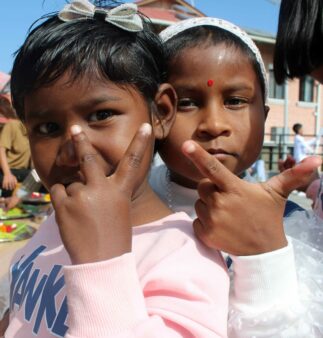
Mina* and Rupa*
Olgapuri Children’s Village
In February 2023, a temporary shelter home referred sisters Mina*, 4, and Rupa*, 3, to Olgapuri Children’s Village.
Mina and Rupa are very close, and very bright. They’re now both attending kindergarten and doing quite well. When they were found by the original shelter, they were determinedly caring for each other the best way they knew how, having been failed by all of the adults in their lives. Our team is thrilled that their days of fending for themselves are over. These sisters deserve a normal, healthy, nurturing childhood—and that’s exactly what they’ll receive at Olgapuri Children’s Village.
Mina and Rupa’s parents married against the wishes of their mother’s family. Their father belonged to a Dalit caste (formerly known as “untouchable”). As a result, their maternal grandparents rejected the entire family.
Family life proved too much of a struggle for the girls’ father, who abandoned the family during the COVID-19 pandemic. Soon thereafter, their mother (who was still rejected by her parents) remarried and started a new life in India with her new husband, leaving her children behind. Even then, Mina and Rupa’s maternal grandparents refused to take them in or even acknowledge them, due to their caste status.
Mina was born with a hearing challenge, and when she arrived at Olgapuri, she was unable to hear or speak. She also hadn’t been exposed to Nepali Sign Language, though she and her younger sister Rupa made good use of a “home sign” language that they developed together organically.
We are amazed at the progress the girls have made. Mina, who is skilled at lipreading, eagerly devoted herself to learning to write in her special-needs kindergarten class. She was awarded first place in her class for handwriting, bringing home a prize of several notebooks, new pencils, pencil sharpeners, and good-quality erasers! The children and house parents at Olgapuri quickly learned how to communicate with her, and they have surrounded her with warmth, kindness, attention, love, support, and safety.
Thanks to a special medical grant from a committed donor, Mina received a cochlear implant over the summer, which is allowing her to hear for the first time. She’s picking up new skills very rapidly and now attends school in the main classroom.
Meanwhile, Rupa—who at age 3 is already her sister’s fiercest advocate—no longer needs to help her sister navigate the world safely. Rupa is enjoying her classes, as well as opportunities to play with other children. She is making connections and relaxing into the stable rhythm of Olgapuri life. She’s experiencing holistic security for the very first time. The girls now have a large, loving family of healthy, attentive adults to meet their needs. And older siblings with ample time and attention to share!

We support NYF because the programs are community-based/grassroots, carried out by Nepali staff (who understand local needs) and are focused on education and health, especially for the benefit of children and young adults.
— Ann, Supporter
Rajendra*
Educating Dalit Lawyers
Rajendra* is from Doti District, a hilly region in far western Nepal. He grew up in a home shared with his parents, two brothers, one sister, and his grandmother.
Overt casteist violence and discrimination were a common occurrence in his hometown. But he also witnessed his neighbors pushing back. Once, he recalls, local police refused to act against a group of casteist young adults who were making a campaign of harassing and abusing Dalit people in the area. Local Dalit families bypassed the local authorities and lodged a case with the district level police. The perpetrators were held accountable and charged a penalty!
Watching this case unfold in real time provided great insight to Rajendra about legal terms and procedures, the importance of law and justice—and ways the law could transform conditions for families and communities like his.
Rajendra was honored to earn an EDL scholarship. He was even more excited when he learned he’d won a seat at National Law College in Kathmandu, one of the best schools in Nepal.
A year into the program, Rajendra is thoroughly enjoying the learning environment at the college. He’s impressed with the quality of the teachers here, and with their teaching methods. When he identifies areas of weakness in his own skill levels, he immediately begins strategizing ways to improve.
Rajendra is tremendously grateful for the Educating Dalit Lawyers scholarship opportunity. He’s looking forward to defending the rights of his community as a fully-fledged lawyer!
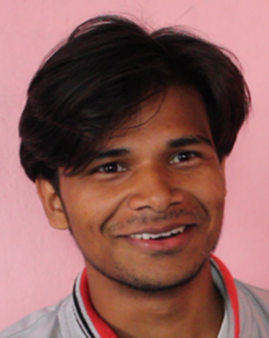

“NYF is addressing important big-picture issues in Nepal without losing touch with the individuals they are serving. “
— Anonymous, Donor
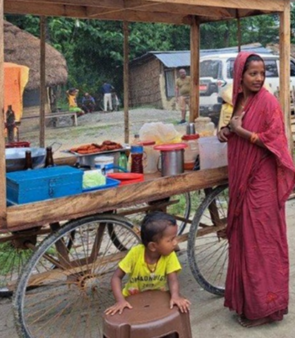
Shanta*
Caste Equality Project, Nutrition Outreach Camps, Vocational Training and Career Counseling
Shanta*, 23, attended one of NYF’s April Nutrition Outreach Camps in Saptari District with her 2-year-old son, Amar. She was very grateful for the opportunity to have her precious son seen by a pediatrician. And she was relieved that NYF was working with local health workers she knew and trusted. Shanta and her family are from the Madhesi Dalit subcaste, so opportunities like these are very rare.
The pediatrician diagnosed Amar with mild malnutrition, but Amar was in otherwise good health. There was no need to refer him to an NRH. Instead, Shanta and Amar sat down with NYF’s nutritionists to discuss practical, affordable strategies to improve the boy’s nutrition at home. During this discussion, Shanta shared details about her background. She had only attended school long enough to write her name and cannot read or write.
She married at age 19. Her husband spends most of the year performing backbreaking migrant labor in Saudi Arabia. Shanta is raising Amar on her own, and she is also responsible for caring for her aging in-laws.
Sending Shanta’s husband and his brother for work in Saudi Arabia was very expensive, and the family incurred a great deal of debt to do so, all in the hopes that the effort would result in better financial stability moving forward. Unfortunately, the investment hasn’t paid off, and Shanta misses her husband terribly.
Shanta has tried to grow wheat and other crops on the tiny plot of land she shares with her in-laws, but the meager earnings from this have never been enough to sustain the family. She frequently goes without meals to ensure her son and her in-laws can eat.
NYF’s Nutrition team made thorough notes during this discussion, and during nutritional counseling sessions with other families. When they returned to Kathmandu Valley, they had a list of early suggestions for Lalit Gahatraj, the CEP Coordinator. Shanta’s story was similar to those shared by many other families. The team suggested that running one of our “Tea & Snacks Shop” trainings in the area would be an impactful start for some of the families we had met.
When NYF announced that they would run an experimental session to assess the effectiveness of these businesses in the region, Shanta signed up eagerly. She completed the training in June 2023. She received her food cart, cooking tools, and other start-up support, and launched her new street food business.
During the first few days, she was already making a profit of 500 rupees per day. This is roughly on par with Nepal’s minimum wage. On big farmer’s market days, she brought in double the money. Amar comes along with his mother and enjoys “quality testing” each batch of snacks. He’s also enjoying a greater variety of fresh vegetables, which Shanta purchases in the markets she works in.
Shanta has quickly developed a sense of her clientele’s preferences, and she is bringing in more income with each month. Her success has been transformative. Soon, she hopes to call her husband back home to Nepal so they can expand this new business and live together as a family. She is confident that together, they can bring in just as much income—if not more—than the wages he is earning in Saudi Arabia.
Support from friends like you make these transformations possible. As we move through 2024, we’re looking forward to the possibilities of the life-affirming transformations in store for the children we serve. Thank you, and dhanyabad!
2023 Giving Guide: Joyful Ways to Support NYF
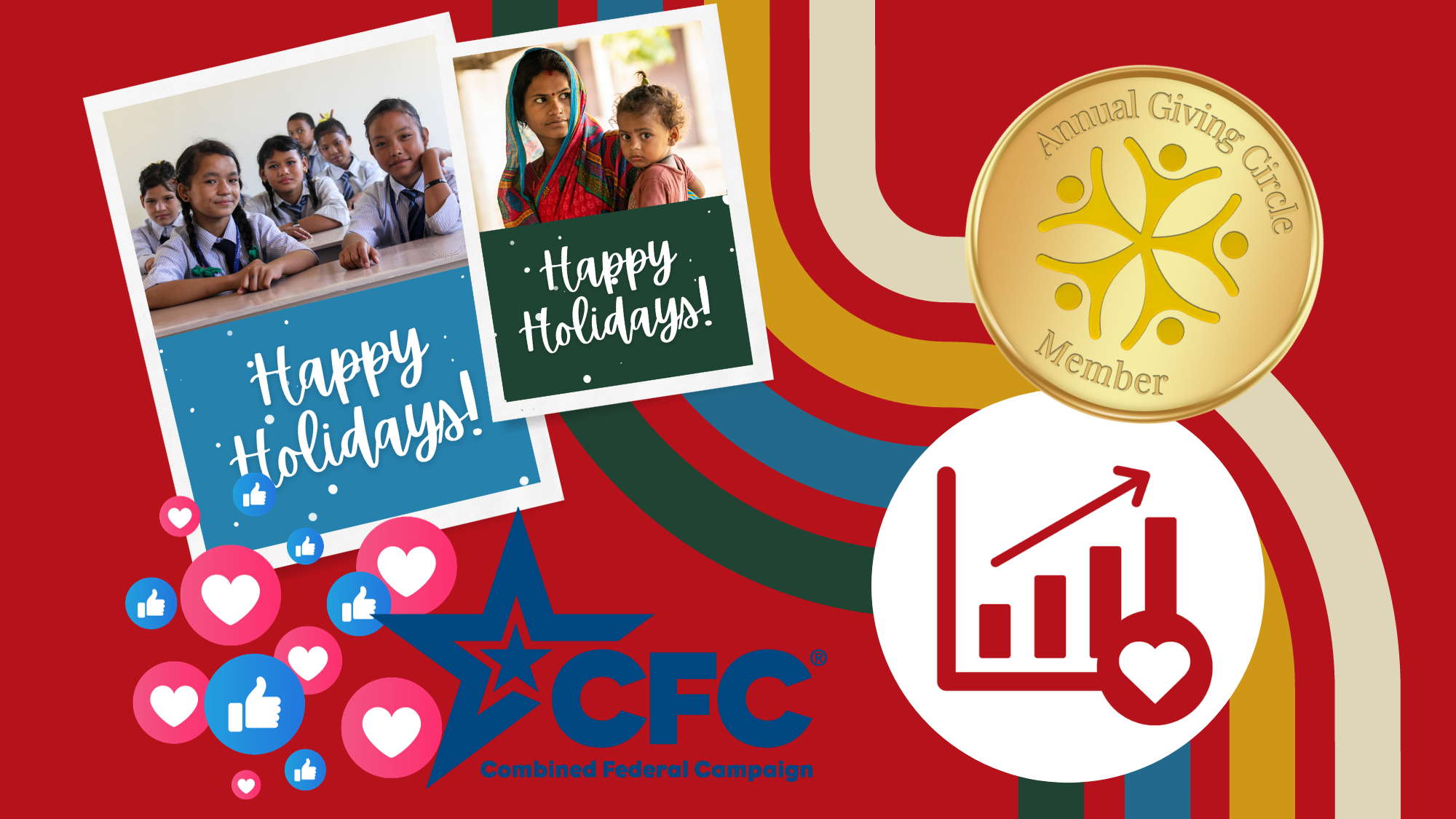
There are so many ways to support NYF’s mission this holiday season—so we put together a brief giving guide to make the most out of your generosity!
1. Give a gift of impact! Send a Holiday eCard.
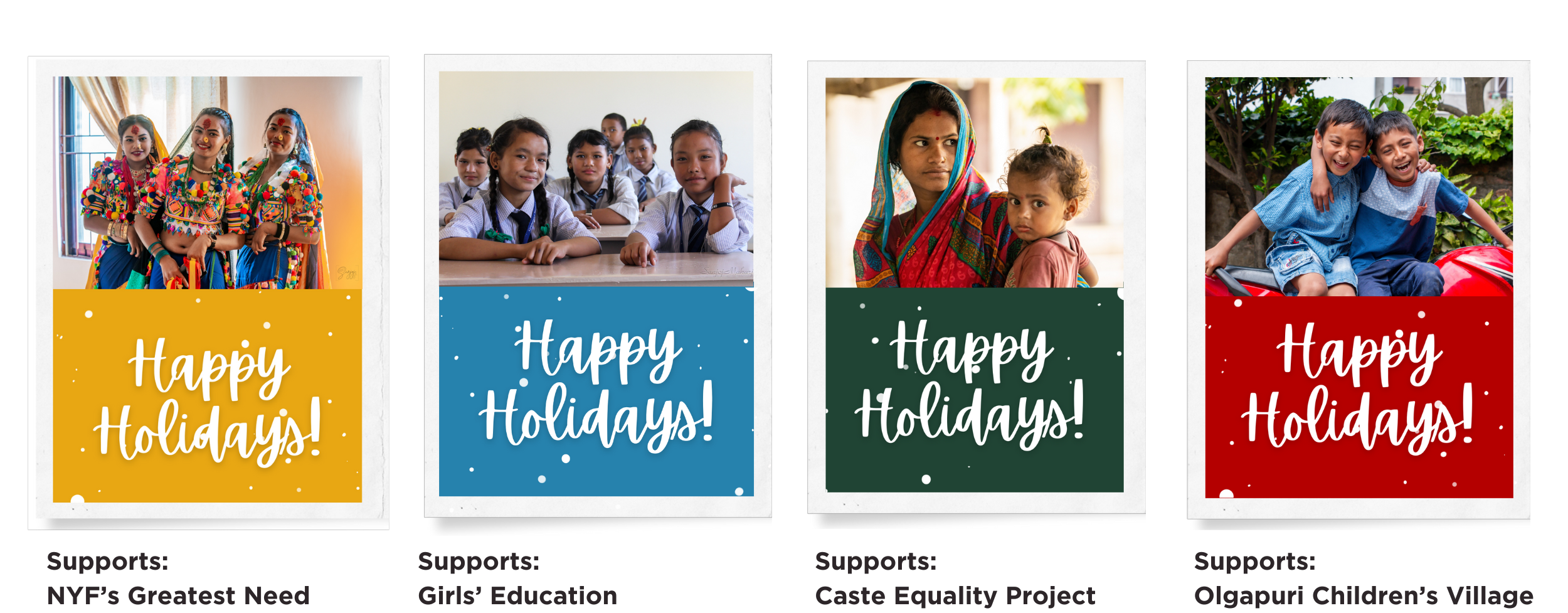
‘Tis the season to give a gift of impact! Our holiday eCards allow you to share the joy of giving with your loved ones this holiday season by making a donation to NYF in their name.
You can choose between four festive NYF-themed eCard designs and include a personal note. Your loved one will receive this special holiday eCard notifying them of this remarkable gift. Each card corresponds to a different program, so you can choose the cause most meaningful to your loved one.
2. Increase your impact through your workplace!
Make your donation go even further. Many companies provide matching gifts to organizations like NYF when their employees make a gift.
Here are just a few examples of companies NYF is currently receiving matching gifts from:
- Microsoft
- Apple
- AT&T
- S&P Global
- Goldman Sachs
3. Engage with NYF’s social media. Follow us, and like and/or share our posts!
We love sharing quick updates about the impact of your generosity on our social media pages. If you’re looking for an easy but incredibly impactful way to support NYF’s work, engaging with our content online is the way to go!
Follows, likes, shares, and comments can boost our work, put our posts in front of new audiences, and build social proof. Our small but mighty fundraising team sees and appreciates each “like” we receive!
4. Federal employees can give through the Combined Federal Campaign.
If you are a federal employee looking for an easy way to support NYF, consider giving through the Combined Federal Campaign!
NYF is a CFC approved charity (#84267), and pledges come directly out of your payroll. Sign up to support NYF through the CFC campaign by January 15, 2024!
5. Introduce NYF to a friend (or two)!
The most effective way to keep building our NYF Community is through you. By having devoted supporters like yourself talk about our work to friends, family, and colleagues, NYF can easily build social proof: An essential way to grow our supporter base. This holiday season, you can make a tremendous impact just by talking about NYF’s work and sharing why you support us!
(If you know someone who would be interested in supporting communities in Nepal and/or exploring corporate partnerships with NYF, let us know! We’re always looking to partner with people and businesses who share our values and mission.)
6. Have appreciated assets? Save on capital gains tax by donating them rather than cash.
Gifts of stock and securities:
Donating stocks and securities that have appreciated in value can be an especially advantageous donation.
- You can bypass the capital gains tax on the amount of the appreciation.
- You can obtain an income tax deduction for the full appreciated value of the securities.
We would receive the securities’ full value. In this way, the cost to you is substantially less than the amount donated to NYF. (Deductions are subject to certain limitations.)
Required Minimum Distribution (RMD)
If you’re over 70.5 with an Individual Retirement Account, nonprofit donations can satisfy your Required Minimum Distribution.
By making a donation to NYF directly from your IRA, you can reduce your taxable income while maximizing your support for the children of Nepal.
Please speak with your financial advisor to see if this option is a good fit for you!
7. Join NYF’s newly-formed Annual Giving Circle!
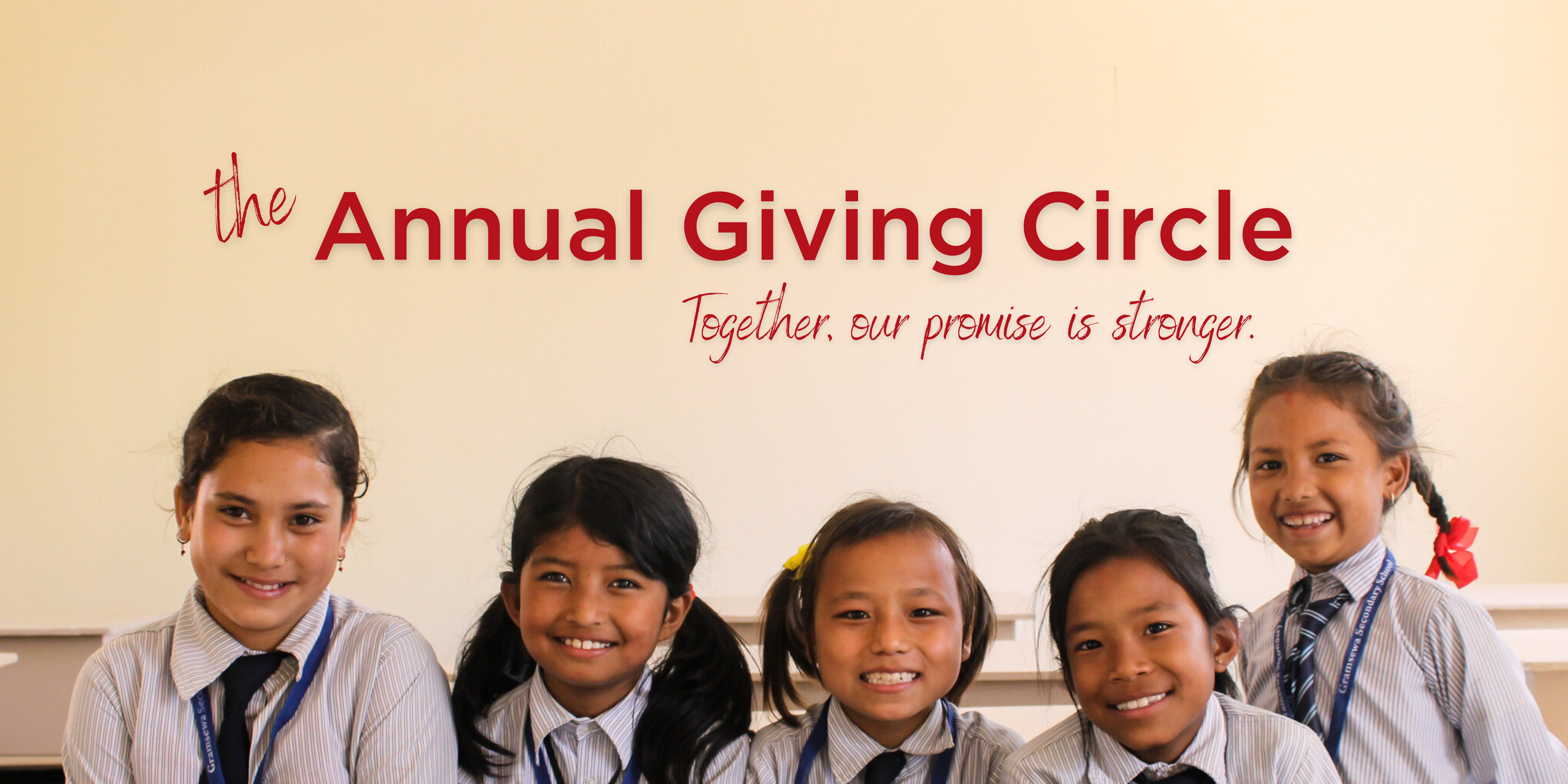
Designed to ensure our shared promise lives on, the Annual Giving Circle is NYF’s way of recognizing those who support our work with an annual gift of $1,000 or more.
Members of the Annual Giving Circle don’t need to change the way they contribute to NYF. All we ask is that you let us know NYF can count on you to contribute at the same time each year so that we can plan and budget with greater confidence from year to year.
In return, we’re cooking up ways to show you how much your generosity is appreciated. And most importantly, to ensure you continue to see the transformative impact your support is creating.
Meet the Saptari District Moms helping to launch the Caste Equality Project
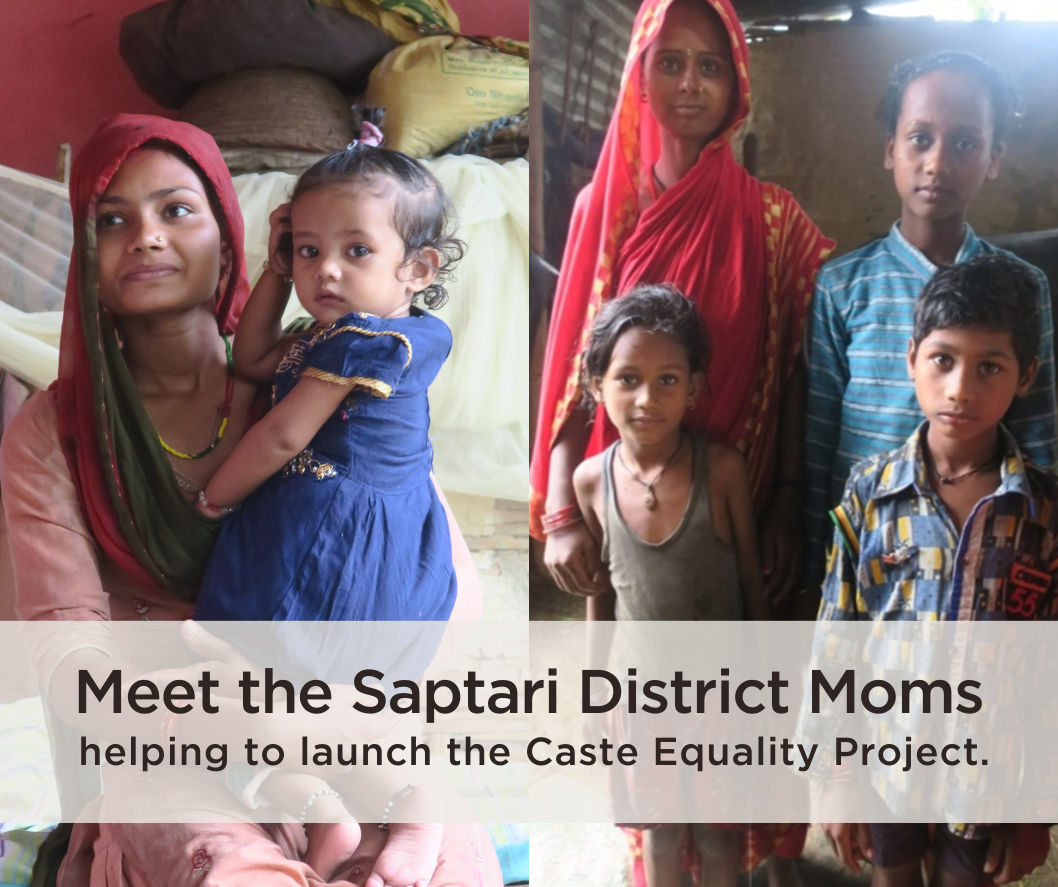
In April 2023, Radhika* (29) joined thousands of families who brought children to a Nutrition Outreach Camp in Saptari District. Her children, Kamala* (13), Dinesh* (10), and Sharmila* (7) had never seen a doctor.
Radhika was anxious at first. Members of Dalit castes, historically labeled as “untouchable” across South Asia, still face tremendous systemic discrimination, exploitation, and societal exclusion. Would they be turned away, or ignored, or even threatened or beaten?
She was relieved when the NYF team told her their organization wanted to help as many Dalit families as possible.
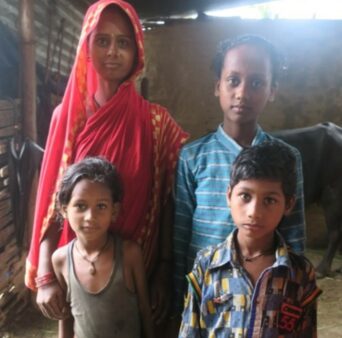
Clockwise from top left: Radhika, Kamala, Dinesh, and Sharmila welcome the NRH fieldwork team into their home for a follow-up visit in Sept. 2023.
While the NRH visit significantly improved their nutritional status, systemic challenges related to caste identity have made that progress difficult to maintain back home.
NYF is helping them and other moms in Saptari District overcome these challenges and achieve lasting health. Meanwhile, their feedback is helping us ensure that the Caste Equality Project is as successful as possible.
Then the pediatrician told Radhika that all three kids were malnourished—Dinesh and Sharmila severely so. She felt a jolt of helplessness, and even shame. But NYF’s team immediately invited the whole family to the Kathmandu Nutritional Rehabilitation Home (NRH) for treatment. Radhika was stunned that the three-week stay would be free-of-charge.
At the NRH, Radhika’s kids quickly gained weight and became healthier. And Radhika mastered the nutrition lessons, even encouraging her kids to participate. At discharge, the family was cautiously optimistic about applying everything they’d learned and continuing their progress.
But when the NRH fieldwork team followed up in September 2023, Radhika had run into significant challenges. Dinesh and Sharmila had started growth spurts. Even though they hadn’t lost weight, they were both technically malnourished again. Once more, Radhika felt guilt and overwhelm. But the NYF team reassured her. Her story highlights unique problems facing the Dalit community. Understanding her challenges is helping NYF create solutions.
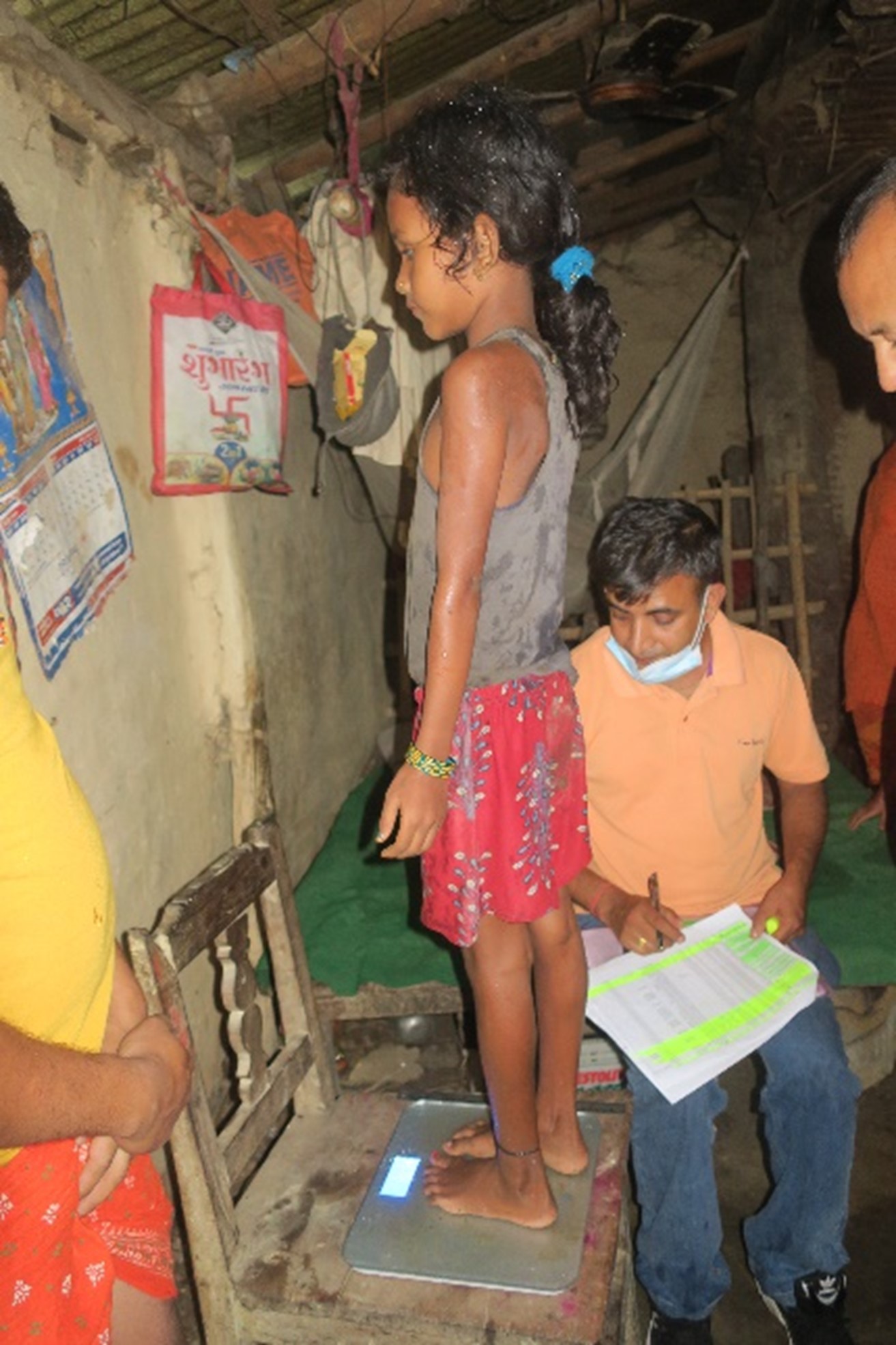
Six months after Sharmila left the NRH, NYF’s Field Supervisor, Ramesh Pant, weighs her to check progress. The family & field team worked together to create a dry, level surface to do so.
Caste discrimination prevents many Dalit families from building sturdy, permanent homes. As our Educating Dalit Lawyers scholars gain experience, they will help families navigate the legal hurdles standing between them & safe, dignified living spaces.
In the meantime, our team is honored to be invited inside these homes. This simple respect helps strengthen the message that no one is untouchable.
Photo credit: Naresh Tuladhar
| Learning from Radhika | Project Solutions |
|---|
| Improved nutrition kicks off important growth spurts. While Radhika is using all the best techniques she learned at the NRH, her growing kids need more food to sustain healthy development than she can afford. | ➤ | Creating a nutrient-rich school lunch program ensures growing kids eat at least one well-rounded meal per day, lowering the financial burden for parents right away. |
| Radhika had children very young without access to family planning knowledge. Feeding multiple “big kids” is more difficult than feeding individual “little kids.” | ➤ | An awareness campaign on child marriage & the dangers of early, rapid childbearing will empower women to marry later & control family size. |
| Radhika makes ends meet by selling milk from their family cow. Ideally, the kids would drink this milk, but they cannot afford to lose this income. | ➤ | Income-generating trainings & small business start-up funds for parents will help them afford the ingredients for a balanced diet. |
| Radhika’s husband is a migrant laborer overseas. She and her children rarely see him. He sends as much money home as he can, but the whole family still relies on daily wages from labor done on local farms. | ➤ | Vocational trainings for young adults provide lucrative alternatives to migrant labor, keep families together, and help parents make enough money to keep their kids in school. |
| Radhika’s family has been denied citizenship rights due to a lack of formal records, so she can’t buy or lease land for a garden. The nearest market with fresh produce is too far away and too expensive. | ➤ | NYF is exploring options to lease land near villages for large community gardens where local women can grow produce for their families and sell excess to their neighbors! |
| Because she can’t own land, Radhika’s house isn’t permanent. Clean water & hygienic facilities are limited. Even when care is taken, water contamination leads to illness, causing rapid nutrient loss. Malnourished children are especially vulnerable to infection. | ➤ | Improving community access to clean water will involve installing plumbing in central areas, raising awareness about water purification & creating a local water management team. |
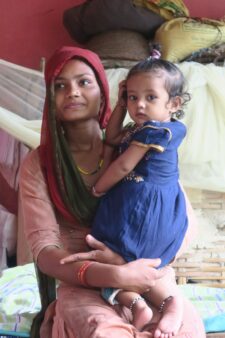
Bina* is one of the best-educated people in her village: she completed grade 10 with excellent scores. She brought her sweet one-year-old daughter Padma* to the same camp Radhika’s family attended. Padma was severely malnourished and needed urgent care at the Kathmandu Valley NRH.
While at the NRH, Bina was surprised to learn how cooking methods impact the nutritional value of food. She felt dismayed that in all her efforts in school, no one had ever taught her any of the nutritional information that would have helped her nourish her baby. Now she knew her usual cooking methods often wasted crucial nutrients. She had even been cutting away and discarding the most nutritious bits!
At follow-up in Sept. 2023 (at left), Bina shared that she is applying her updated knowledge every day. Padma’s health is better than ever. Bina’s health is better, too. Vegetables are hard to access in Bina’s village—she has to walk an hour to get to the market. But Padma’s health is worth the trip. Bina has wrapped this errand into her regular routine, and she’s sharing tips with her neighbors, too!
The Caste Equality Project is NYF’s most ambitious initiative yet. We’re vowing to empower Nepal’s Dalit communities
—starting right here in Saptari District.
Saptari District Moms like Radhika are helping shape this project!
A message of gratitude from Olga Murray and Som Paneru!
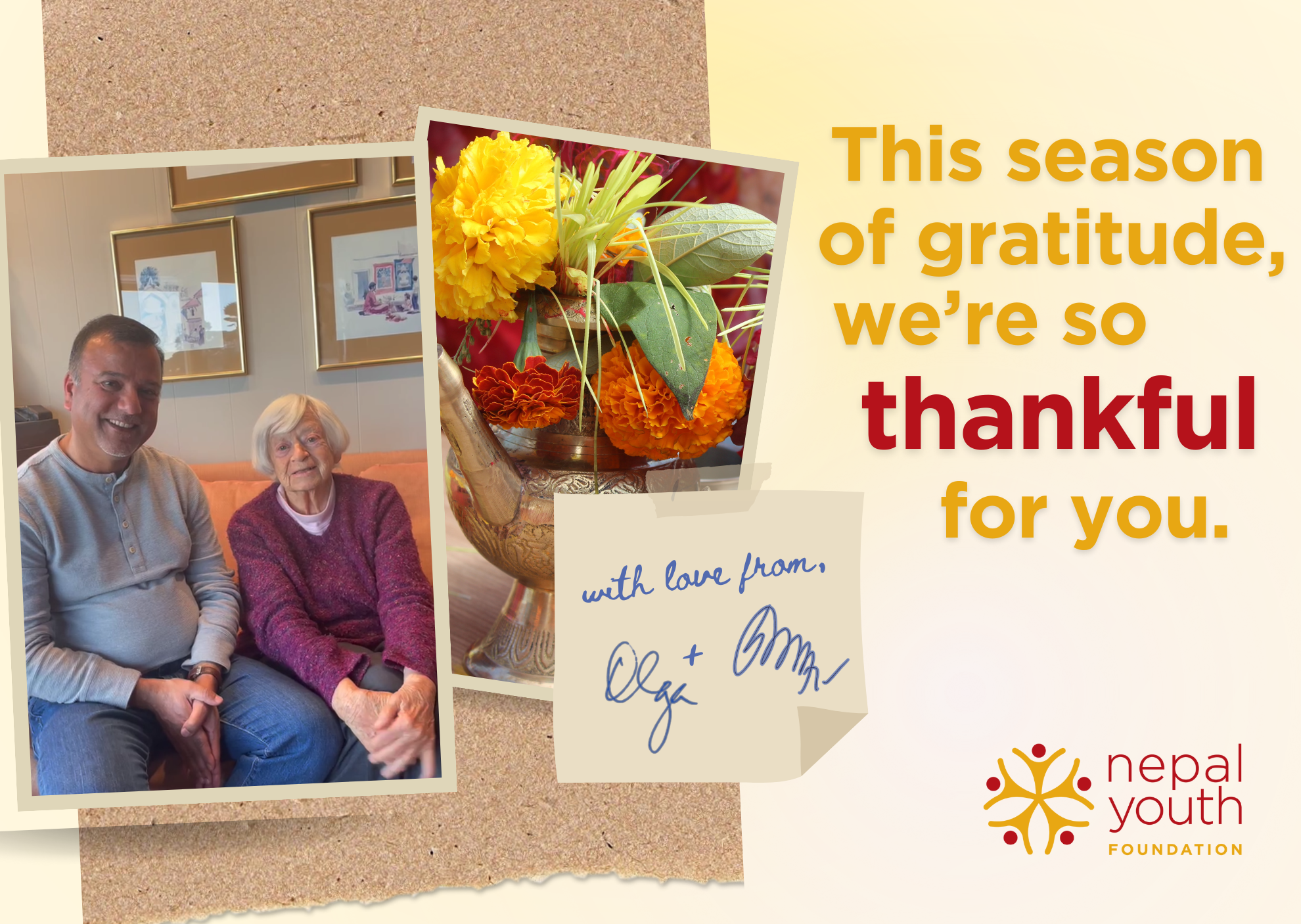
This time of year, we’re giving thanks to our NYF Community.
Just last month, Olga was honored to host NYF President, Som Paneru and his family in her home in California to carry on their tradition of celebrating Dashain together. Dashain is a vibrant, beautiful 10-day festival in Nepal that incorporates rituals and gatherings for expressing gratitude for abundance and prosperity throughout the year. This year, Som and Olga gathered to reflect on all the work in 2023 made possible by your generosity.
Families in Saptari District who have already received transformative support in our nutrition program give thanks for the health of their children. The region’s Dalit community looks to the coming year with hope as we launch the Caste Equality Project. Our most recent Olgapuri Vocational School graduates celebrated this year’s Dashain with certifications in hand. Many of them are already employed in their new fields. And the list of reasons to be grateful goes on!
As the season of giving thanks continues, Som and Olga take a moment to share this message of gratitude to our extended NYF family. We celebrate the remarkable impact that, together, we have generated among thousands of Nepali children and young people. And thanks to you, that impact is only growing.
We look forward to your continued support and commitment to our mission of creating brighter and healthier futures for the rising generation in Nepal.
On behalf of the entire team, Som and Olga wish you all joy, good health, and prosperity as you come together to celebrate this season of giving thanks. Dhanyabad!
Thank you again to our NYF Community! Here are some ways you can support our work this end-of-year season:

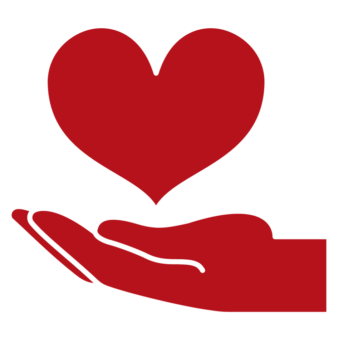
Make A
Year-End Gift
Ensure your #LoveWorks this end-of-year season by making a donation.
For nonprofits like NYF, the “Giving Season” between now and December 31st provides a crucial benchmark for planning transformative programming in the new year.
Your generous support powers this moment of growth. Click below to make an impactful donation now.

Double Your Donation
Our matching gift campaign starts on 11/28/23.
All NYF donations made between GivingTuesday, November 28th and Tuesday, December 5th are eligible for a 1:1, dollar-for-dollar match—up to $20,000 total match.
We hope you’ll join the #GivingTuesday momentum this year by donating during this special matching opportunity.

Holiday
Gift Cards
Make a holiday gift and select an eCard for your honoree.
This holiday season, give loved ones the gift of impact. Make a donation in honor of somebody special (or two!) and send them an NYF-themed card to notify them.
Each card corresponds to a different NYF program, so you can choose the cause most meaningful to your loved one.
Staff Spotlight: Laxmi Ghimire
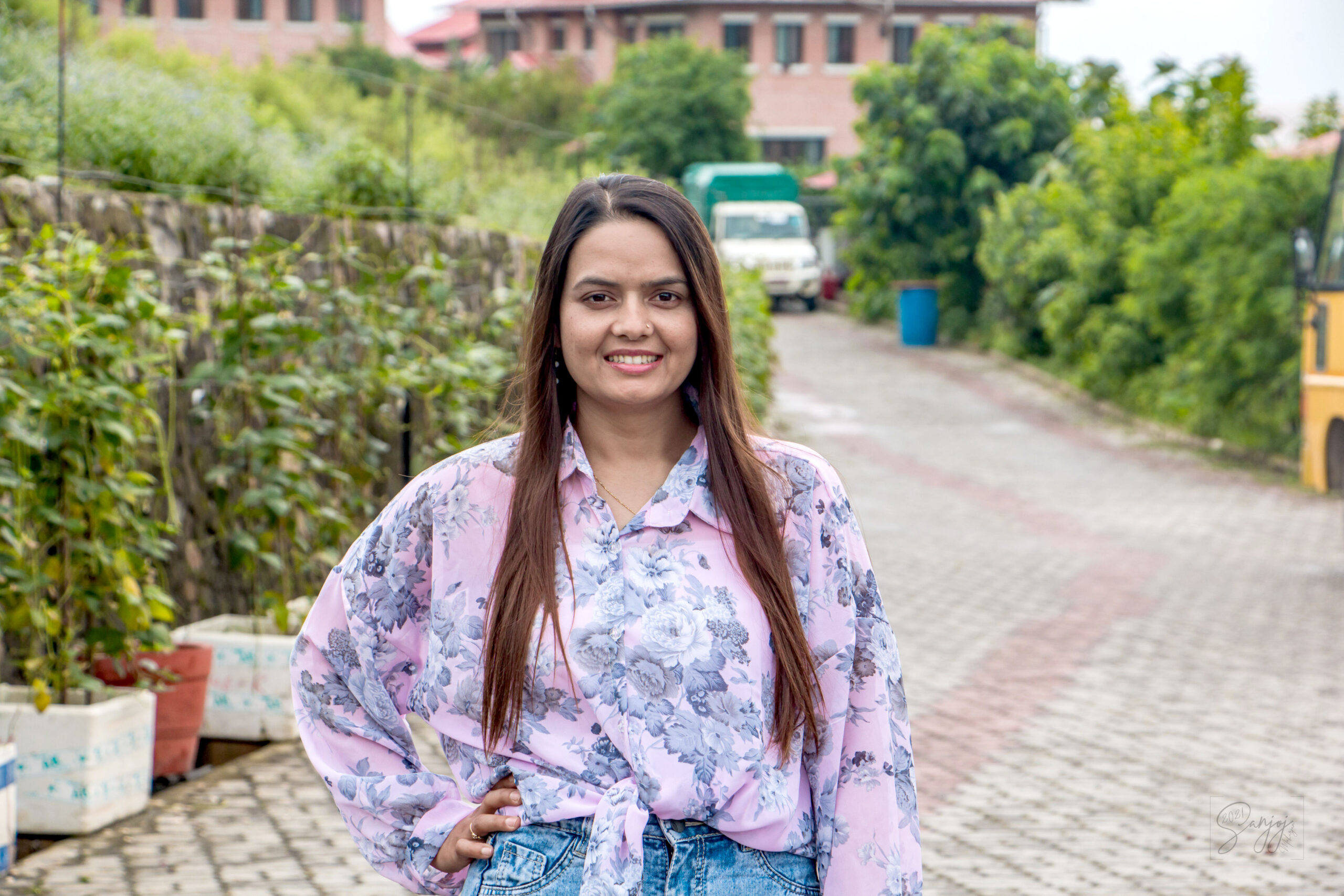
Laxmi Ghimire, NYF’s Career Counselor & VECC Program Manager
Ten years ago, Laxmi Ghimire had a solid job in office administration and HR at a Kathmandu IT company—but the sector just wasn’t the right match. “Every second day I would feel like switching jobs,” she recalls. Her coworkers were very supportive, but, she says, “I was not enjoying it at all.”
Her one favorite part of the position was the Corporate Social Responsibility fund. The company matched one percent of each employee’s salary. This fund provided scholarships to 13 students, including future software engineers. Laxmi helped identify and manage these scholarship recipients. “These students attended a very big university in Nepal,” she says. “They had not even dreamed of that university if the company had not given the scholarship. This was the beautiful part of my job. This was the thing I wanted in my life.”
Laxmi & NYF
Laxmi Ghimire began exploring job opportunities focused on social work, and she sent in an application for an “Associate Career Counselor” position at NYF. Her work and education background made her an incredibly strong candidate, and in July 2014, she joined the Vocational Education & Career Counseling team.
“I took a risk,” she says about swapping careers. “But it was wonderful taking a risk.” Laxmi has been on the NYF team ever since, and she is now both a Career Counselor and the VECC Program Manager. Since joining NYF, Laxmi has pursued additional qualifications, including a Master of Technical Education & Vocational Training degree from Kathmandu University, allowing her to grow her own impact for each of the students she reaches.
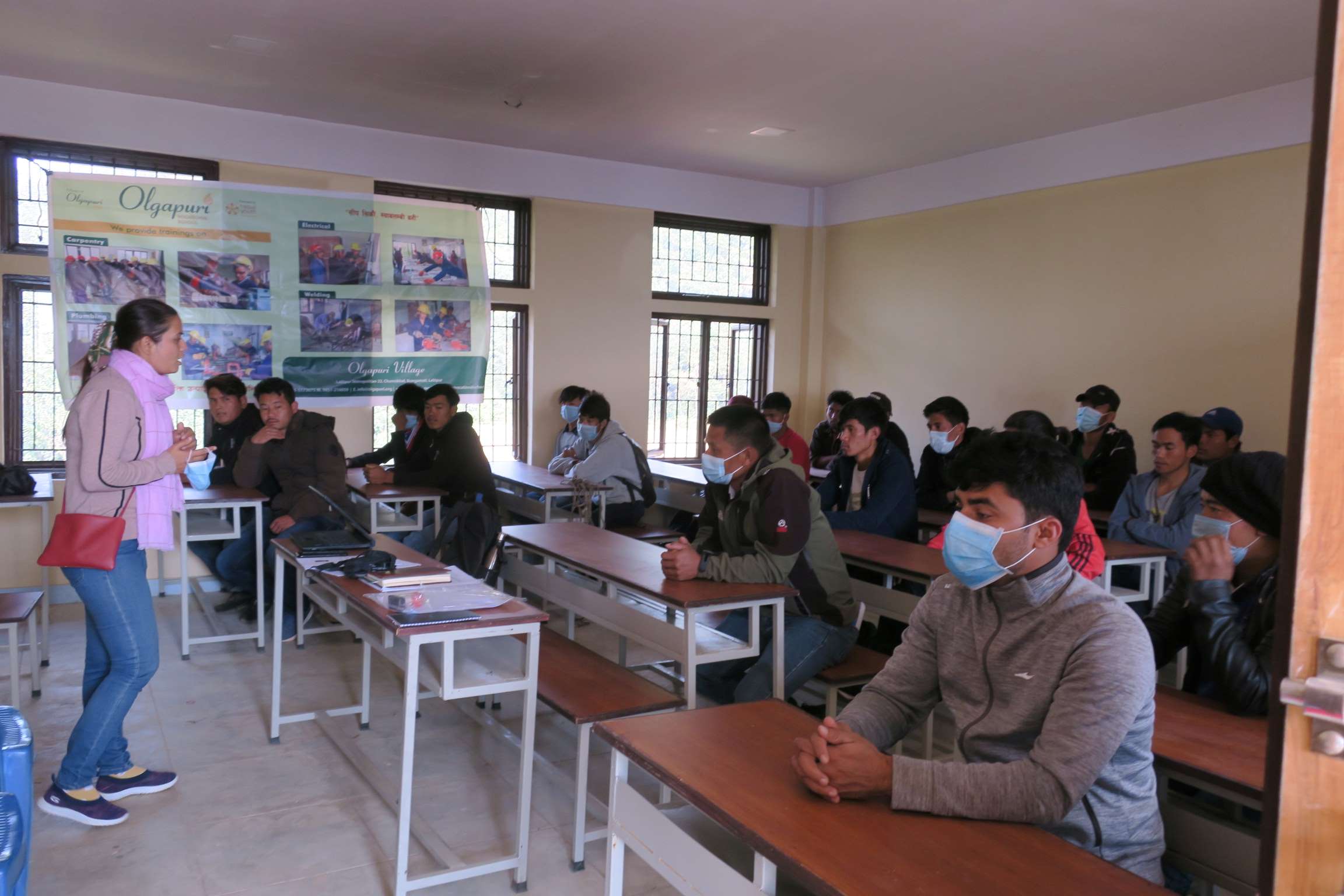
Laxmi matches young adults with career paths that allow them to reach their unique goals. Her work emphasizes technical education programs, but sometimes these programs are stepping-stones for students in special circumstances.
Jivan’s Journey
She shares one memorable example of a young man named Jivan*, who came from a hilly region in western Nepal where the terrain made agricultural work so difficult that most young men took migrant labor jobs in India or Saudi Arabia. Jivan wanted a career in government, to improve conditions for villages like his. So he put himself all the way through a master’s degree in sociology—and then was devastated when he was unable to find any job at all.
Jivan eventually accepted a teaching job near his village, where he was paid less than $80 a month. His relatives, neighbors, and peers pressured him to seek a higher-paying job abroad, so he became a migrant laborer in Saudi Arabia. Conditions were terrible. After two years with no improvement in sight, unable to meet his basic expenses, and profoundly homesick, he reached a point where he preferred being unemployed in Nepal than remaining stuck where he was.
Jivan meets Laxmi at Olgapuri Vocational School
Fortunately, soon after returning to Nepal he attended an Olgapuri Vocational School presentation in his area. Jivan connected with Laxmi for a career counselling session. He thought if he completed a vocational training course, he’d at least be able to take on skilled work, even if he wasn’t using his degree.
Jivan completed the three-month Olgapuri Vocational School (see page on Facebook) electrical course and quickly found a solid job in Kathmandu earning enough to cover not only his basic expenses and support for his family, but also the tuition for a government prep course that he hoped would finally open the door to his dream.
He worked hard for 11 months, performing electrical work full-time by day and attending evening classes. Then, Jivan sat for his government exam—and passed. He is now working at the officer level in the Nepali government. His nontraditional career path has provided him with a wealth of experiences that help him understand the plight of so many others throughout his country, and he’s a better representative because of it.
Laxmi admits that this impact story is unusual. Most of the young adults she works with stick with their new vocational trade, building thriving small businesses in their home villages, establishing themselves in a 9-5 job in one of Nepal’s cities, or using their new skill as an extra source of income when they’re not needed on the family farm. No matter what path each graduate takes, the positive impact on their life trajectory far exceeds the cost of the training.
“We see thousands of lives transforming,” Laxmi says. “Very small things, very small contributions we do, and their life transforms. This really brings goosebumps within us.”
Challenge & Opportunity
During the height of the COVID-19 pandemic, Laxmi and her team had to think creatively to continue offering technical education opportunities during lockdown. They finally decided to try taking Olgapuri Vocational School trainings outside of Kathmandu, with trainers isolating in rural villages and then offering the three-month courses to local young adults. This new approach to vocational training was much more successful than anyone at NYF expected.
“And now I would say this pandemic has created an opportunity,” Laxmi explains. “[These students] never would have gotten access if we were only limited to Olgapuri. And now because we were not limited to Olgapuri, many people have access to that training. That was the challenge as well as the opportunity during the pandemic.”
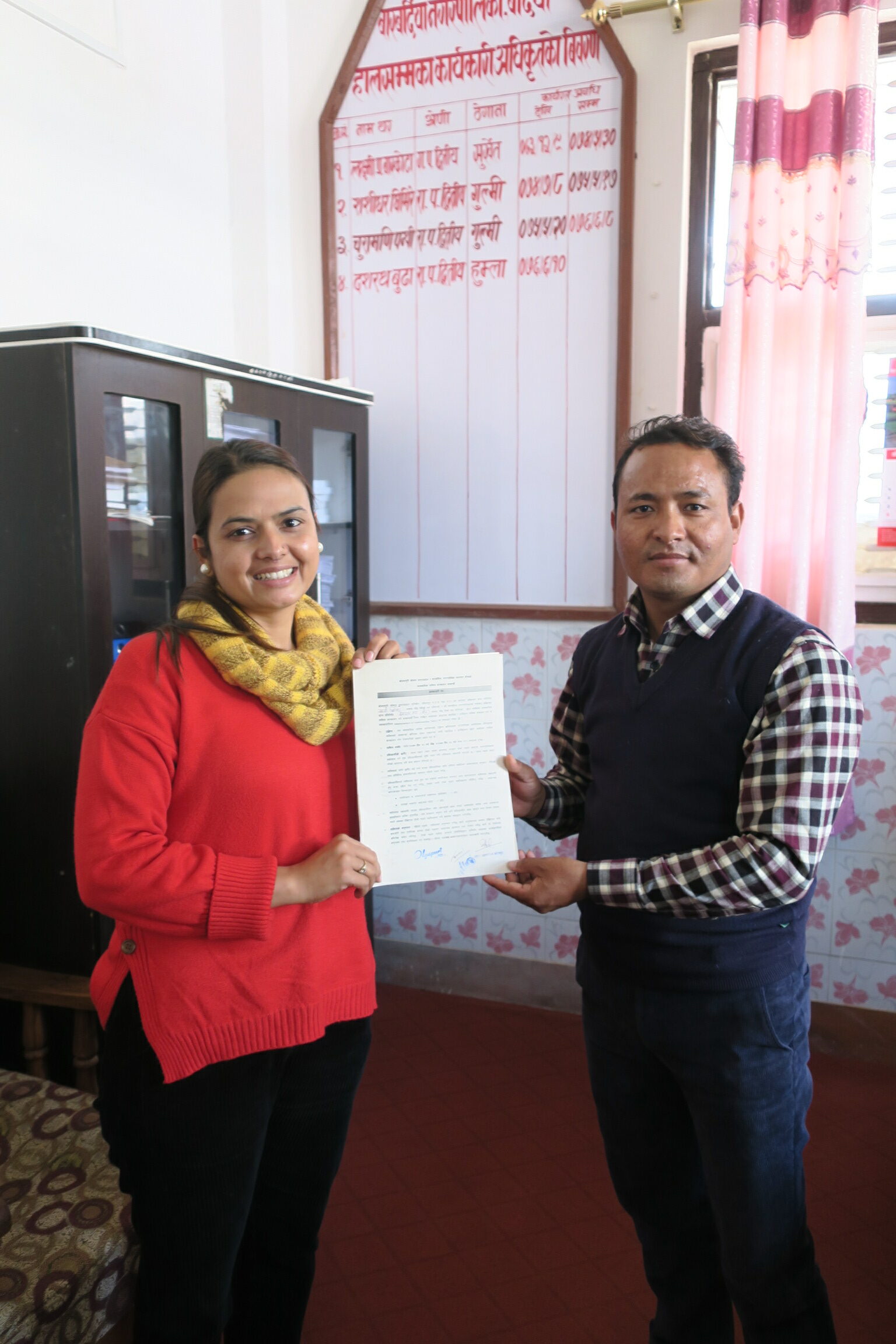
There’s now a waiting list of rural municipalities hoping to bring NYF vocational training courses to their areas. “Satellite” plumbing and electrical trainings are in especially high demand. The presence of locally based plumbers and electricians instantly makes both amenities much more affordable and accessible to these communities, drastically improving the quality of life for everyone living nearby.
Laxmi is excited about the potential for expansion in this area. Many young adults in Nepal aren’t aware of how lucrative technical careers can be, believing their only options are college, subsistence farming, or migrant labor.
Beyond Satisfaction
For Laxmi, there’s special joy in watching prospective students begin connecting the dots between one of our three-month courses and the potential to build forward with power. During orientation presentations, she scans the crowd for “hopeful eyes”—that moment it dawns on someone that they’ve found a viable, expansive path.
“When they come to the training, they come with lots of dreams,” she says. “It’s a short-term training, but they come with big dreams. That’s a wonderful part of my job. That is the best part, I think.”
Laxmi Ghimire wishes all of NYF’s generous supporters could witness each of these transformations the way she does. “Just a small donation makes a big transformation,” she says. “A big change in somebody’s life. It’s something beyond satisfaction.”
An Expanded Mission for the New Life Center
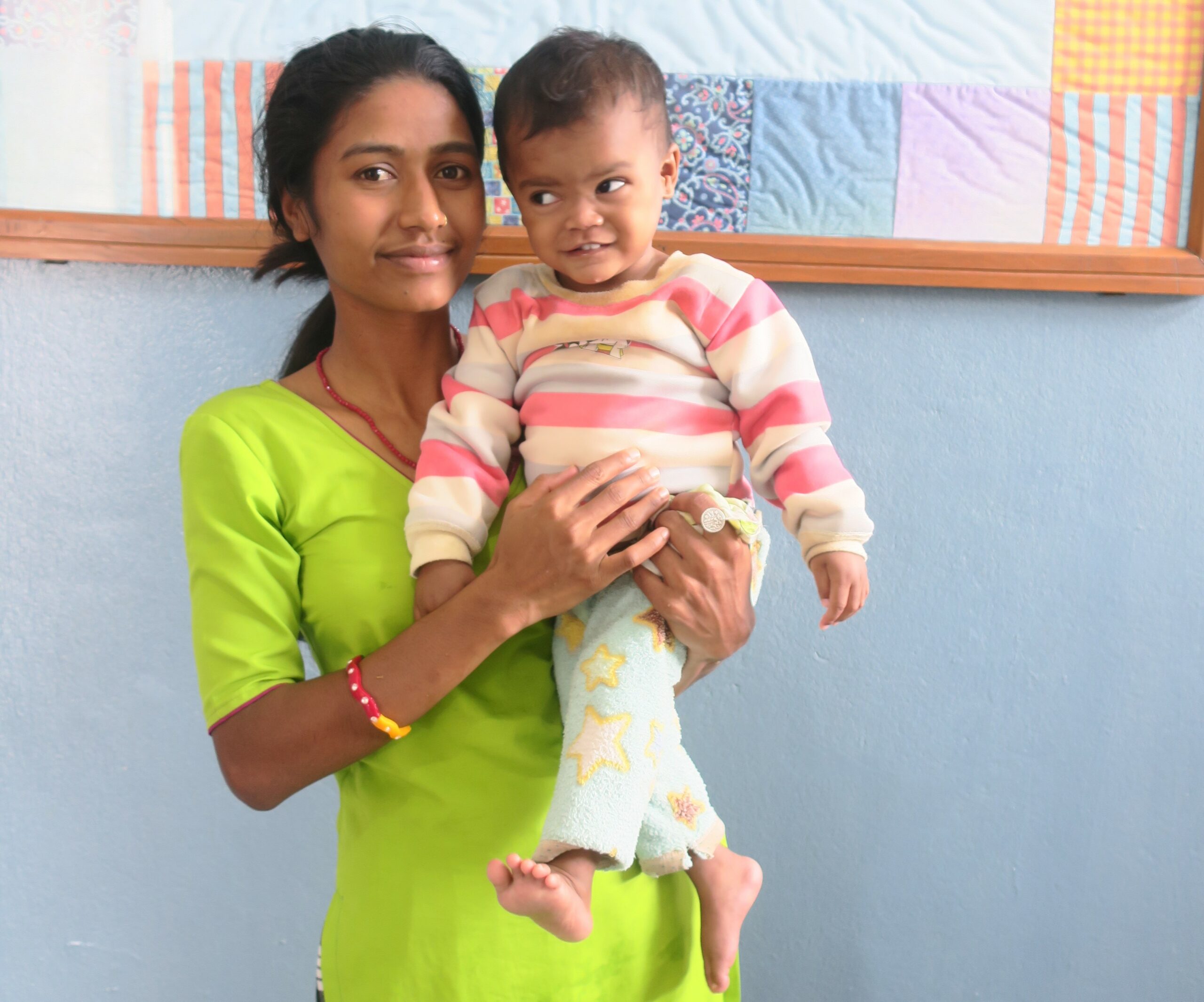
An expanded mission for the New Life Center (NLC) began effective July 2023, thanks to tremendous progress made in Nepal’s fight against pediatric HIV/AIDS!
The New Life Center has become a medical recovery home, not only for children living with HIV, but for kids and expectant mothers visiting Kathmandu for any critical medical treatment or surgery.
We are so grateful that a loving & enthusiastic NYF supporter has fully funded the New Life Center through June 2024! To support health and wellness for Nepali children this year, please consider supporting our Nutritional Rehabilitation Home. This facility, right next door to the New Life Center, serves hundreds of children per year.
Before: Empowering Kids Living with Pediatric HIV
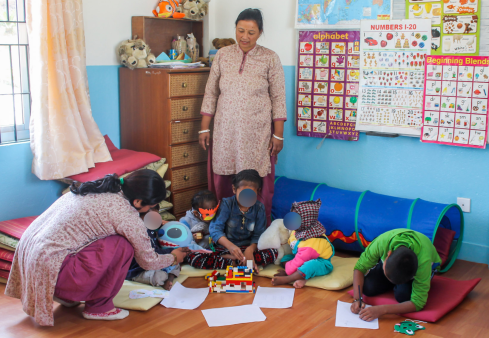
NYF established the New Life Center in 2006 as a specialized care home for children (aged 0-14) living with HIV/AIDS. Our young patients, whose fragile immune systems were already under attack from this aggressive virus, spent time in our care frequently as they grew, receiving special, loving, personalized care from our nursing staff.
Once a child’s immune system finished developing at age 15, our team connected them with their local HIV/AIDS organization for adults. This ensured strong continuity of care. Meanwhile, these local organizations referred families to the NLC whenever they learned of a child living with the virus.
Many of these children have also received NYF scholarship support in grade school and beyond!
Between 2006 and 2023, the NLC became a premier resource in Nepal for families impacted by pediatric HIV. Our team has saved hundreds of lives and empowered their families. Their work has also helped lower both virus transmission and the stigma faced by Nepalis living with this challenging diagnosis.
Nepal has made tremendous progress in slowing the rate of mother-to-child transmission of HIV. This has resulted in a reduced need for a specialized facility exclusively for children living with the virus.
Changing Health Needs
In March 2020, NLC patients returned to their home villages to avoid exposure to COVID-19, leaving the NLC almost empty. During the worst of the pandemic, the NLC cared for mild-to-moderate COVID patients who were unable to isolate at home. We offered remote care for our HIV patients, with great success. Thanks to these innovations, in 2022, the NLC received the smallest number of in-person HIV/AIDS patients since opening in 2006. Most beds remained vacant.
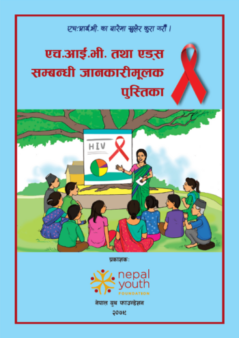
NYF spent 2022 and the first half of 2023 engaged in an ambitious HIV/AIDS Awareness & Advocacy Campaign. We proudly partnered with several grassroots organizations in districts with high rates of HIV. These organizations—Makwanpur Women’s Group (Makwanpur District), Bara Plus (Bara and Parsa Districts), and Lumbini Plus (Nawalpur and Parasi Districts)—allowed us to make quick, strong connections with local changemakers and beneficiaries, which maximized our impact. Creating a unified action plan, without interrupting the existing services each organization offered, allowed us all to serve these communities with efficiency and strength. It also created a cohesive, powerful message about HIV/AIDS Awareness & Advocacy.
You can learn more about the original mission of the New Life Center, as well as the HIV/AIDS Awareness & Advocacy Campaign, on our historical New Life Center – HIV/AIDS program page.
Between 2022 and 2023, we printed 14,000 copies of our HIV/AIDS guidebook (view the flipbook here). We originally only planned to print 500, not expecting demand to be so high! Our team distributed copies to families living with HIV, students and their teachers, women’s groups, hospitals, doctors and nurses, organizations intersecting with issues related to HIV, government offices, and community representatives. Access to this information is making tremendous headway in educating the public. NYF will continue distributing this resource as long as demand continues.
NYF has a particularly strong reputation in Nepal, for integrity, longevity, and effectiveness. Partnering NGOs reported that our project led to greater trust from the local governments, schools, and even community members living with HIV. Many of the individuals living with HIV in these areas had already intersected with the NLC, either through their own children or from having been a young NLC patient themselves. NYF’s public trust in smaller local organizations strengthened the impact of these grassroots resources.
Raising the profile of these locally-led organizations has already made their services more effective. We also trained these passionate local teams with learnings from our 17 years of experience.
Now: An Expanded Mission for the NLC
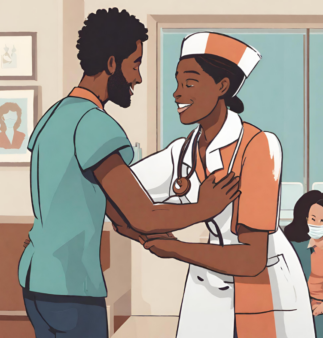
With the need for a specialized pediatric HIV/AIDS facility on the decline and the strengthening of local HIV/AIDS organizations, NYF realized that our beautiful New Life Center could now offer an broader service to the children and families of Nepal.
In 2023, the New Life Center’s mission expanded to include children and families traveling to Kathmandu for all kinds of life-changing medical care, including HIV, but no longer limited to it.
This resource allows children from some of Nepal’s most remote regions to access their right to healthcare.
Most of Nepal’s hospitals—especially those offering specialized treatments—are centralized in Kathmandu. A recent study showed that 57% of Kathmandu patients have traveled for treatment from more rural areas. This is a devastating expense for many families.
The New Life Center empowers children and families to access life-transforming medical care, to heal thoroughly without dangerous complications, and to live full, rich, joyful lives free of the long-lasting burden of crushing medical debt.
Children and their caregivers stay at the New Life Center for an average of 15 days. This is the typical duration required for follow-up and recovery from the acute medical conditions and procedures we typically see. They receive individualized, supportive care free of charge, including monitoring from nurses, nutritious meals created under the recommendation of our dieticians, emergency support and ambulance service where needed, psychological counseling as-needed, and practical, supportive advice from our staff on how to understand and implement their doctors’ discharge instructions at home.

Learn more about this program (and some early impact stories!) on the updated New Life Center – Medical Recovery Home program page.
Dhanyabad!
Thank you for the loving support that has made the New Life Center’s expanded mission possible!
NYF has been an important part of Nepal’s remarkable progress in the fight to end pediatric HIV/AIDS. We’re continuing to put our knowledge and resources to use in supporting individuals and families who are living with this challenging diagnosis. All of this is possible thanks to loving supporters like you.
Now that the New Life Center is serving a wider audience, our impact is expanding more than ever. Thank you for sharing our mission, bringing Health access to children all over Nepal!
Finding hope through NYF’s Nutritional Rehabilitation Home (NRH): Meet Rinof
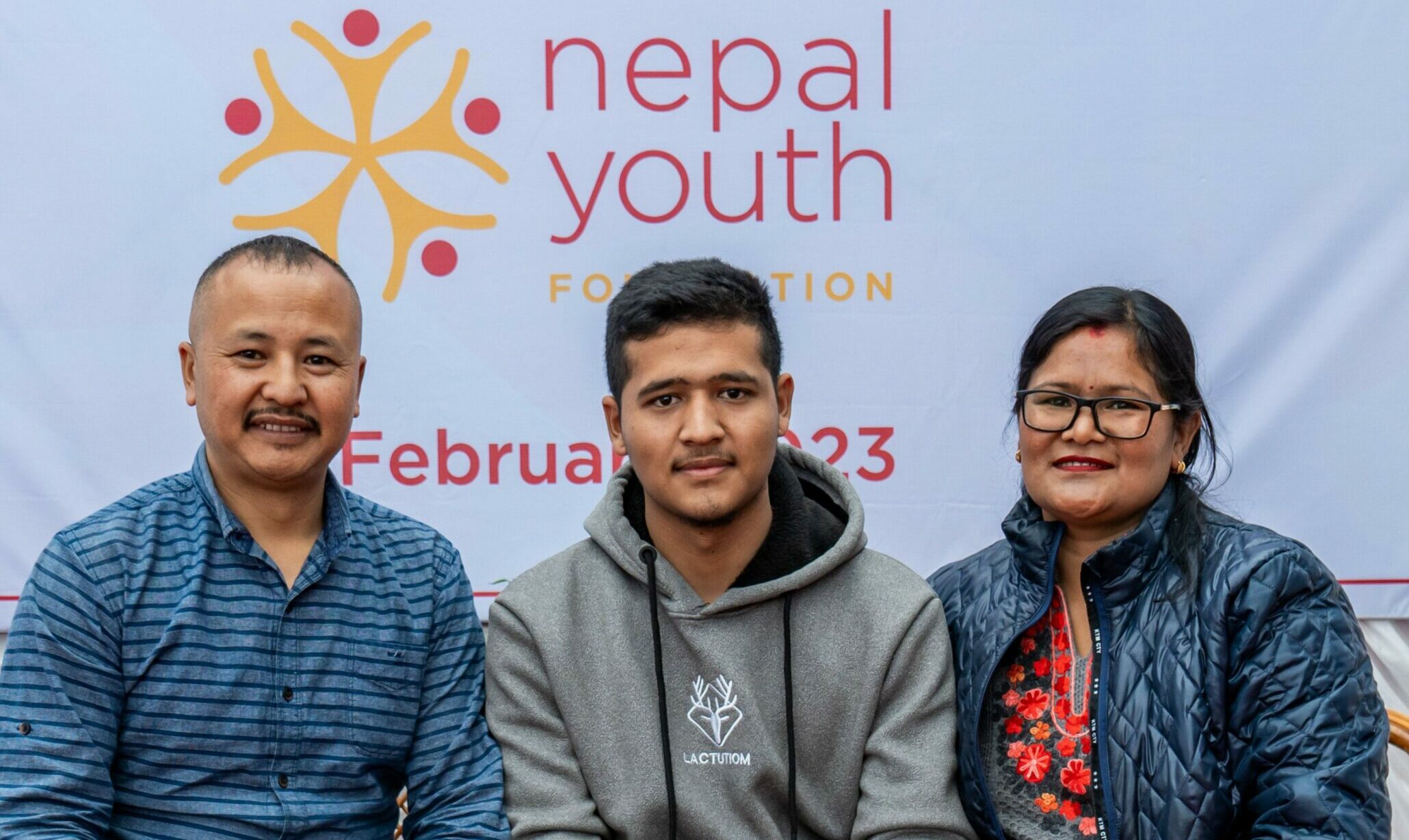
In 2008, young mom Rijana sat wide-eyed in a Kathmandu hospital, cradling her 10-month-old son Rinof while the doctor gave her a set of seemingly impossible discharge instructions. Her heart sank as she listened.
Rinof had had a terrible infection and had undergone major intestinal surgery. He weighed only 11 pounds (about half the weight of a healthy 10-month-old), and Rijana was incredibly grateful that he had survived the procedure—but for Rinof to be truly healed, he would need a second, more intensive surgery within the next few months.
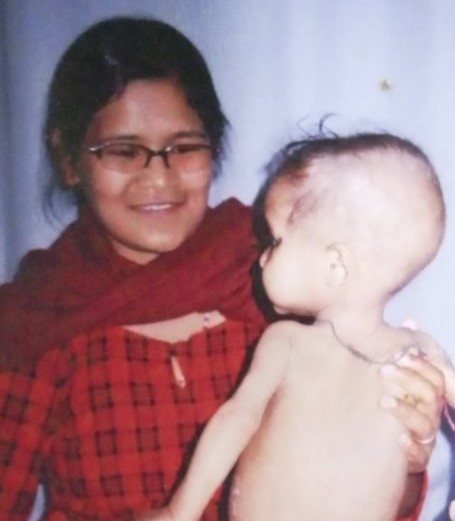
The surgeons would not risk performing this second operation on a child so small. Somehow, Rijana would need to bring the boy’s weight up to at least 22 pounds, ideally by Rinof’s first birthday. Since the weight gain was not considered a medical matter, the hospital was discharging them, with instructions to return when he was ready for surgery.
Rijana could not imagine how she could accomplish this weight gain—especially with Rinof’s digestive system so fragile that it required surgery.
But then, something truly life-changing happened. As Rijana prepared to leave, she met an NYF staff member. The staff member was arriving with a nutritious meal for another child staying in the hospital. He noticed how frail and weak Rinof was, and how heartbroken Rijana seemed. He quickly told her all about the nearby Nutritional Rehabilitation Home (NRH).
Rijana and Rinof went directly from the hospital to the NRH, where NYF’s loving staff members quickly began developing a special diet for Rinof. “At the NRH, my son got such good treatment that he started gaining weight. I also learned so much about nutrition and how to take care of my malnourished child,” Rijana says now.
“I learned so many things that I never knew. In school health classes, we are taught only theoretical things that we don’t know how to apply in real life. The NRH teaches very vital things with hands-on practice that one can apply in everyday life.”
Over the next 28 days, Rinof steadily gained weight and Rijana absorbed as much information as she could. When Rijana felt confident, she brought Rinof home to continue their progress. She excitedly shared what she had learned with her husband, Naresh. Soon, Rinof’s surgery went forward, with great success.
Today, Rinof is a strapping, vibrant young man, taller than both of his parents, and preparing to enter college.
He recently earned a certification in Computer Applications, and he spends some of his free time volunteering as an art teacher for grades 1-5 at a local school, where he is quite popular.
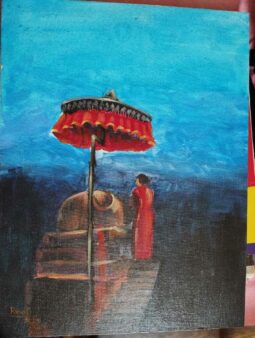
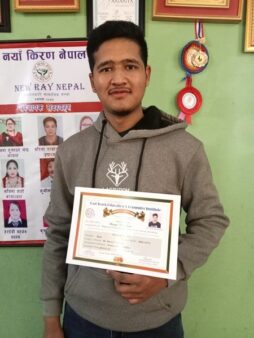

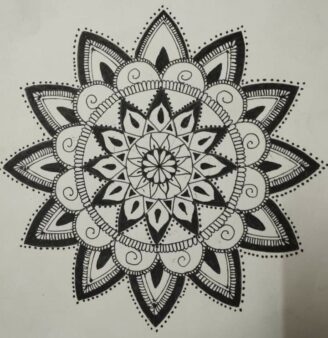
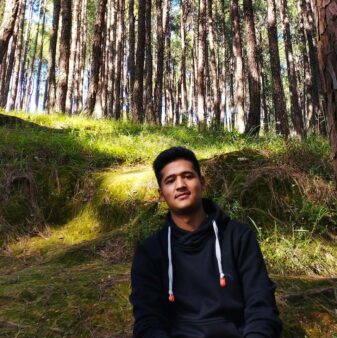
Top row, left and right: Rinof’s artwork; top row, center: Rinof holding his certificate of excellence in Computer Applications. Bottom row, left: Rinof’s artwork; bottom row, right: Rinof enjoying the outdoors!
“The NRH not only saved my son’s life but also taught me so much,” Rijana says. “Since my time there, I have been involved in a lot of work, mainly to do with women and children. I have worked with mothers’ groups and I have been a member of the municipal committee for child protection. Every time, the first thing I tell people is about nutrition and about the NRH.”
Rijana hopes to share this knowledge with 28 thousand people in the community—one thousand people for each day she and Rinof spent in the Nutritional Rehabilitation Home (NRH).
Rinof’s father, Naresh, also quickly became committed to NYF’s mission. Today, Naresh is the NRH’s on-staff driver, managing both the ambulance and regular transportation for children visiting the hospital. Whenever he has an anxious parent riding along, he shows them photos of Rinof, and tells the story of his son.
Rinof’s success story is one of thousands. And it’s all possible thanks to supporters like you!
- Learn more about NYF’s Nutritional Rehabilitation Home (NRH)
- Watch an NRH transformation story on YouTube
Nepal Youth Foundation launches Phase II of Caste Equality Project!
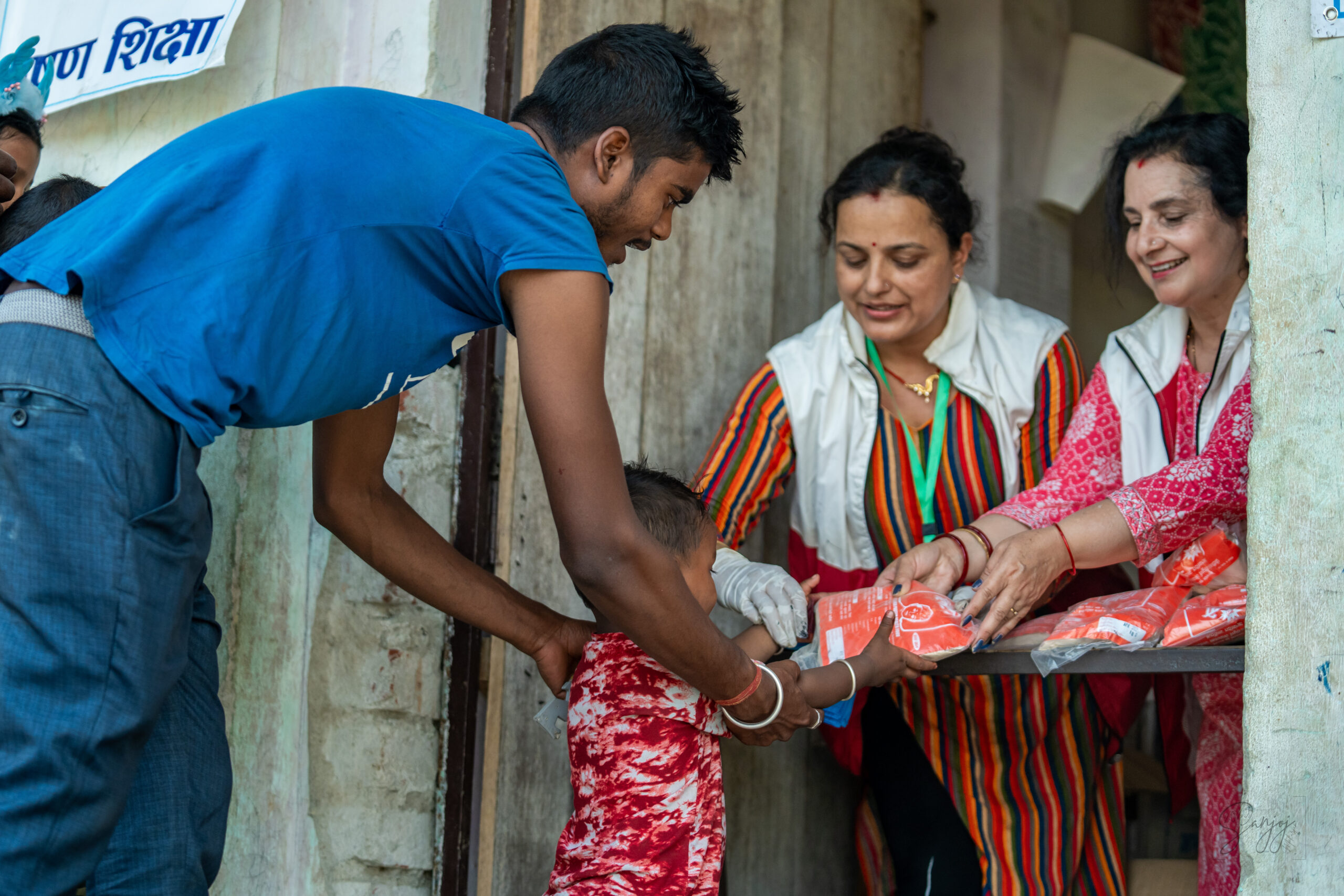
We are beyond excited to share that earlier this month, NYF officially launched Phase II of the Caste Equality Project (CEP) in Saptari District! (For more information and updates about Phase 1: Educating Dalit Lawyers, click here.)
Saptari District is a region of Nepal where Dalit populations (those historically called “untouchable”) face particularly complex barriers between themselves and crucial resources like education, good nutrition, safe shelter, and more. NYF is finally beginning the work of turning the tide for children living in Saptari District, bringing 30+ years of expertise—and the promise of longevity!
Watch our launch video on YouTube:
Phase II will bring specialized versions of our existing, proven programming into the Musahar Dalit villages of Saptari District. We’ll also be working with 2-3 villages first before gradually expanding to reach more. Over a generation (or more!), NYF will work to empower these communities to break cycles of inequity and foster community-led growth and achievement—just like we did with the Tharu communities in western Nepal between 2000-2020†.
† In early 2000, NYF learned of the practice of kamlari bondage, in which young girls from the Tharu ethnic minority were being sold into kitchen slavery by their fathers. This was happening due to systemic oppression of their communities, including patterns of predatory lending, which were making this practice necessary for family survival. During the next 20 years, NYF embedded a team in the regions impacted by this practice, intervening on behalf of the girls and providing the community supports needed to obliterate the practice legally, in actual fact, and even on the level of community acceptance. Click here to learn more about this remarkable success.
Between the summers of 2023-2024, NYF has plans in Saptari to:
- Drastically improve the daily midday meal in schools, using learnings from our Community Nutrition Kitchens during our earthquake response and our COVID-19 response. The meal will meet each growing child’s core nutritional needs. This will improve school attendance and will improve the nutritional status of the children themselves.
- Organize town meetings to help teachers, local government officials, and parents create a joint, cooperative strategy where K-12 education is concerned.
- Establish a safe “study hall” environment as a space for preschoolers (all day) and older children (after school) to receive educational support, allowing parents to focus more on working without worrying about childcare.
- Provide vocational training for 20 young adults in construction trades like plumbing, electrical, welding, and carpentry. These young adults will then return to their villages to begin their first trade jobs: improving the school buildings back home!
- Bring school infrastructure to usable standards, including bathroom improvements, safety, and more.
- Establish a local co-op/savings group among the women, beginning by providing livelihood training and business start-up support to 20 mothers.
- Begin establishing a peer counseling program.
- Launch a large-scale awareness and prevention campaign about topics related to women’s health: menstrual hygiene, early marriage, nutritional health, and the traditional dowry system, for example.
- Hold adult literacy classes.
- Organize disaster preparedness programs and establish emergency response resources within the villages themselves, including forming an action group for disaster response, plus environmental protection and hygiene (for example, protecting water safety).
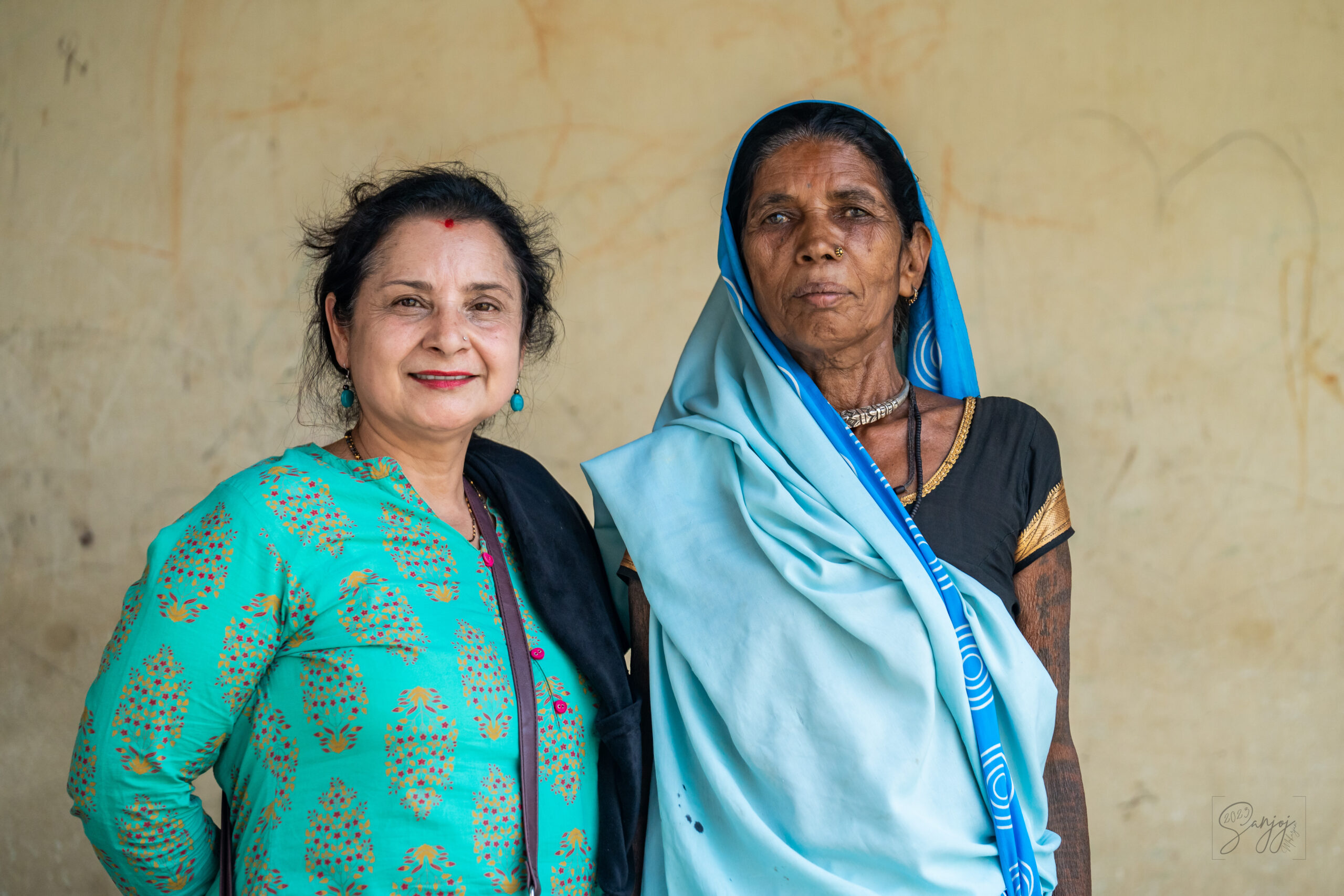
Pictured above: Sunita Rimal, NYF’s Nutrition Coordinator, with a community health worker in Saptari District during a nutrition outreach camp earlier in 2023.
How you can help:
Our team on the ground in Saptari District will pay strict attention to the successes and pain points of each of these programs, always ready to adjust where needed. But for our programs to have lasting, sustainable effect, NYF needs strong support from friends who know the power of healthcare and education in the lives of children, families, and communities!

